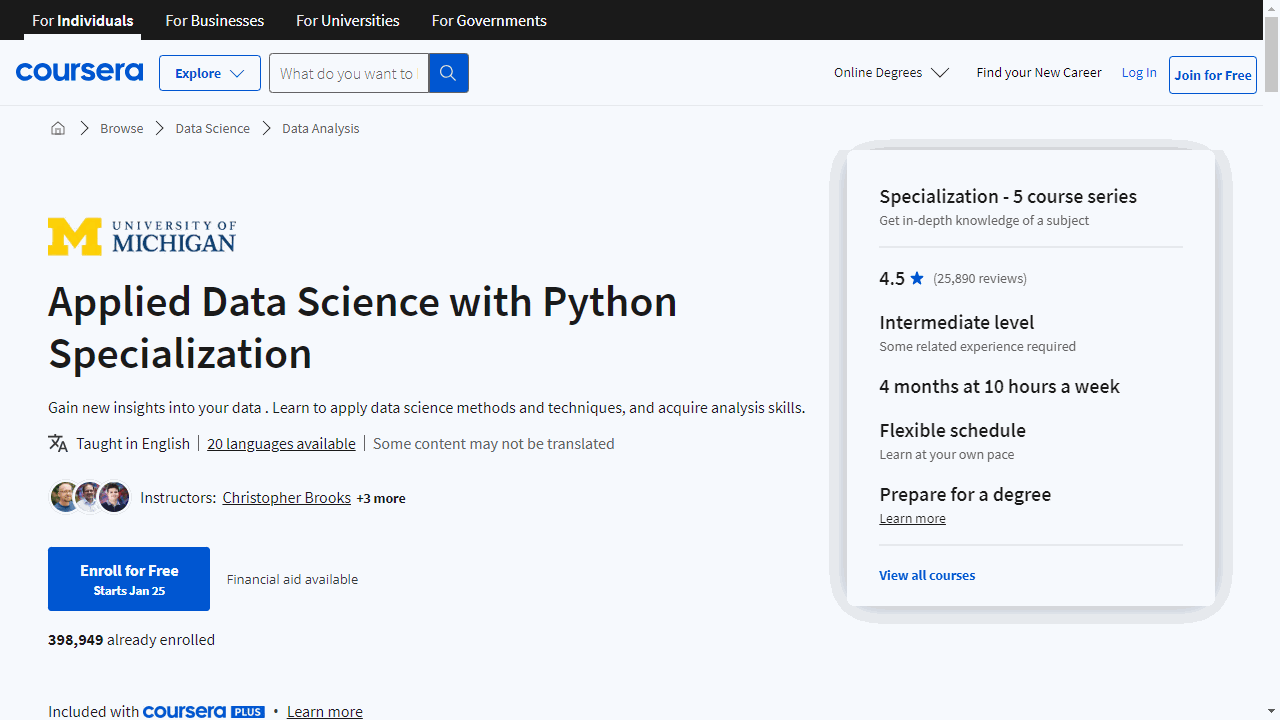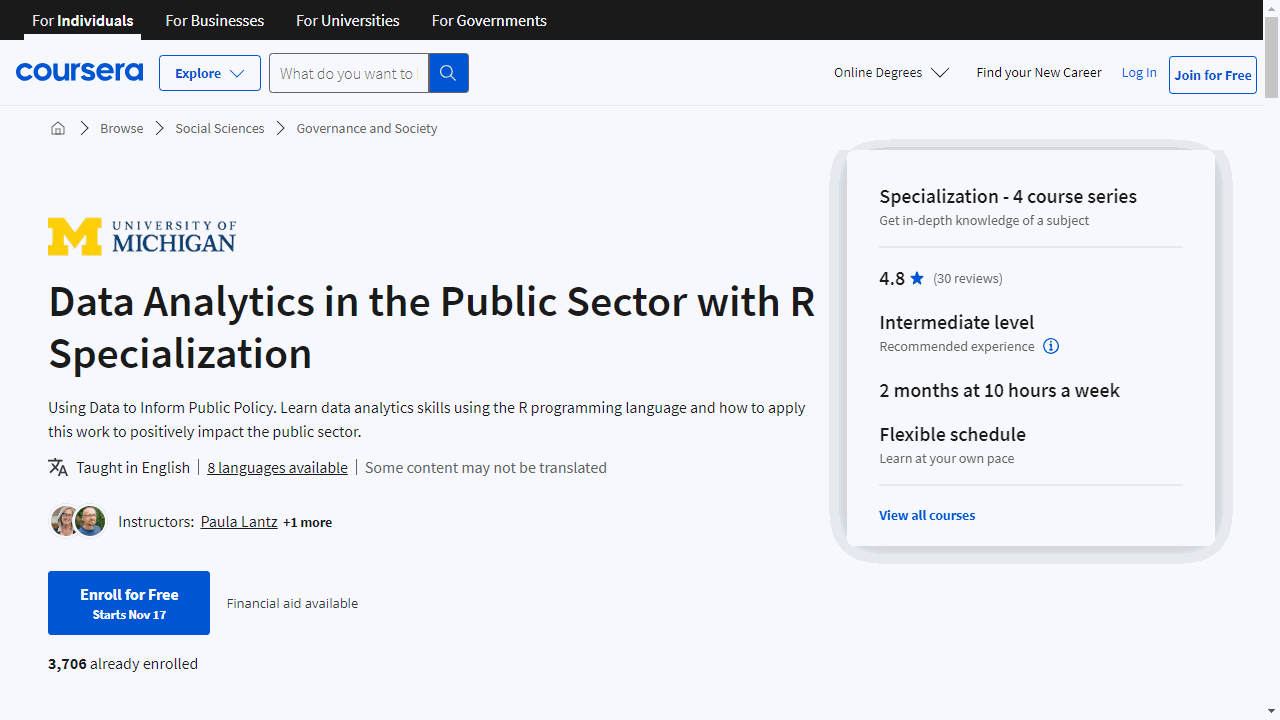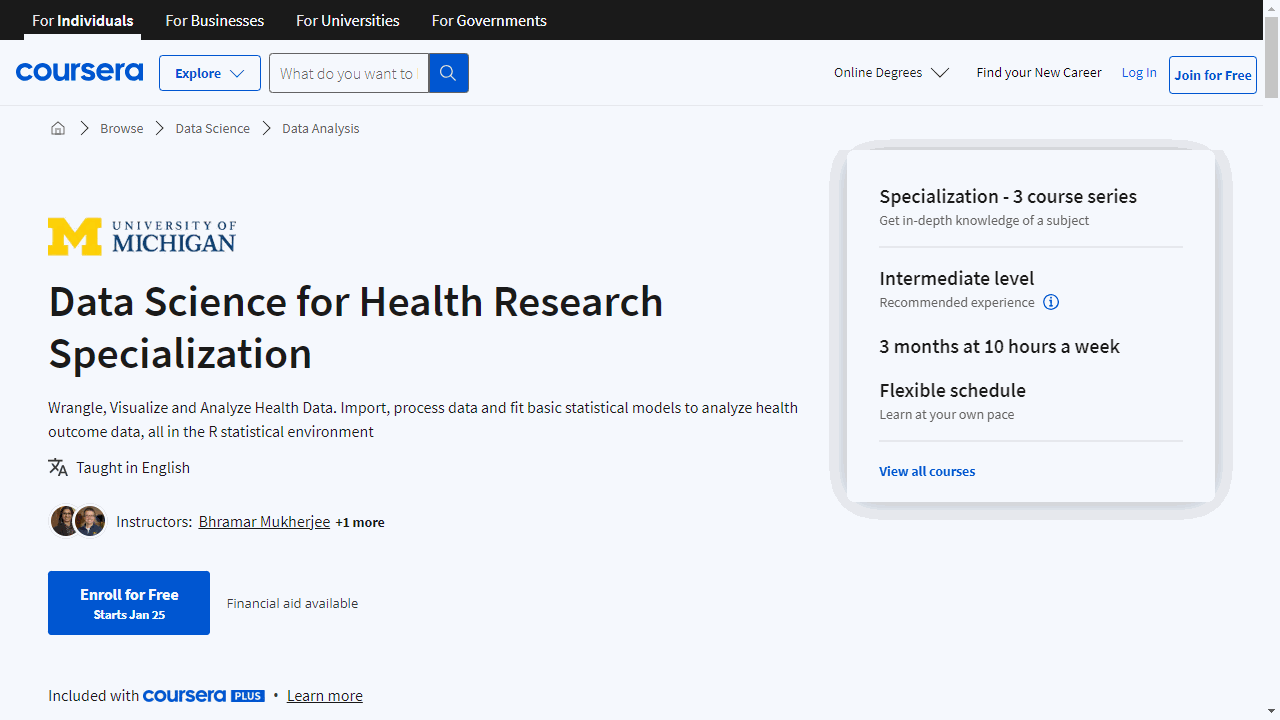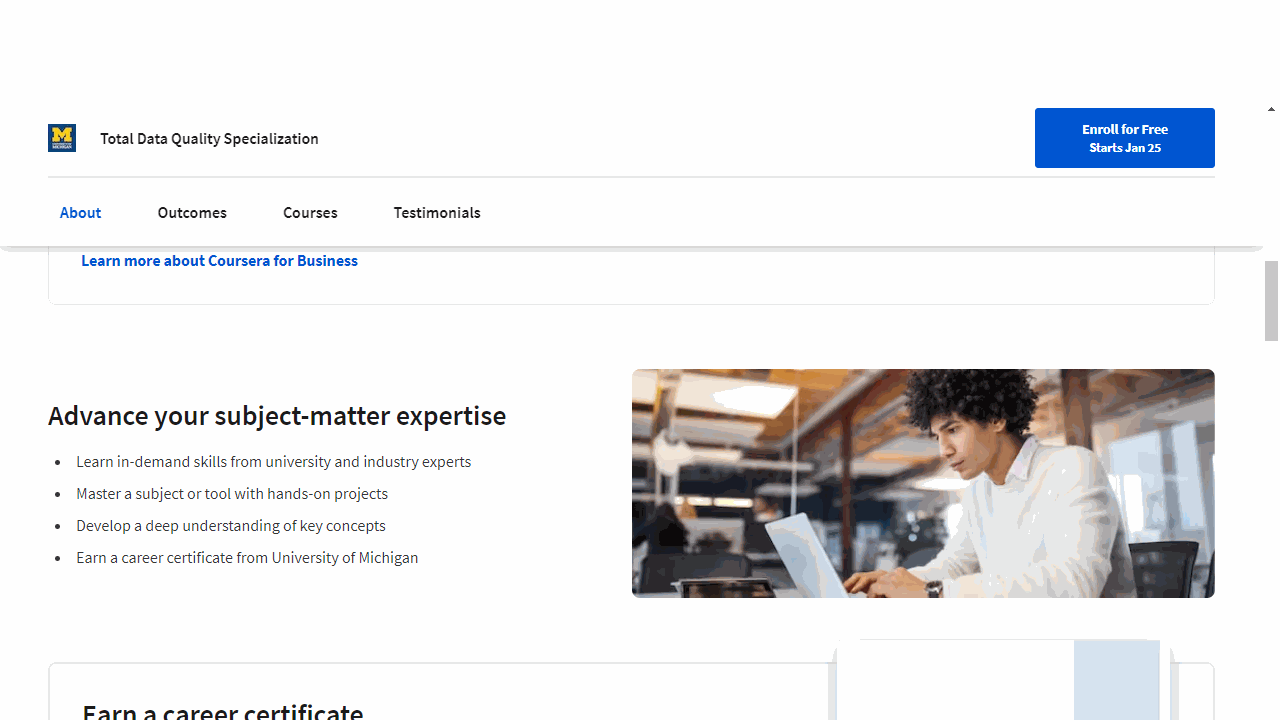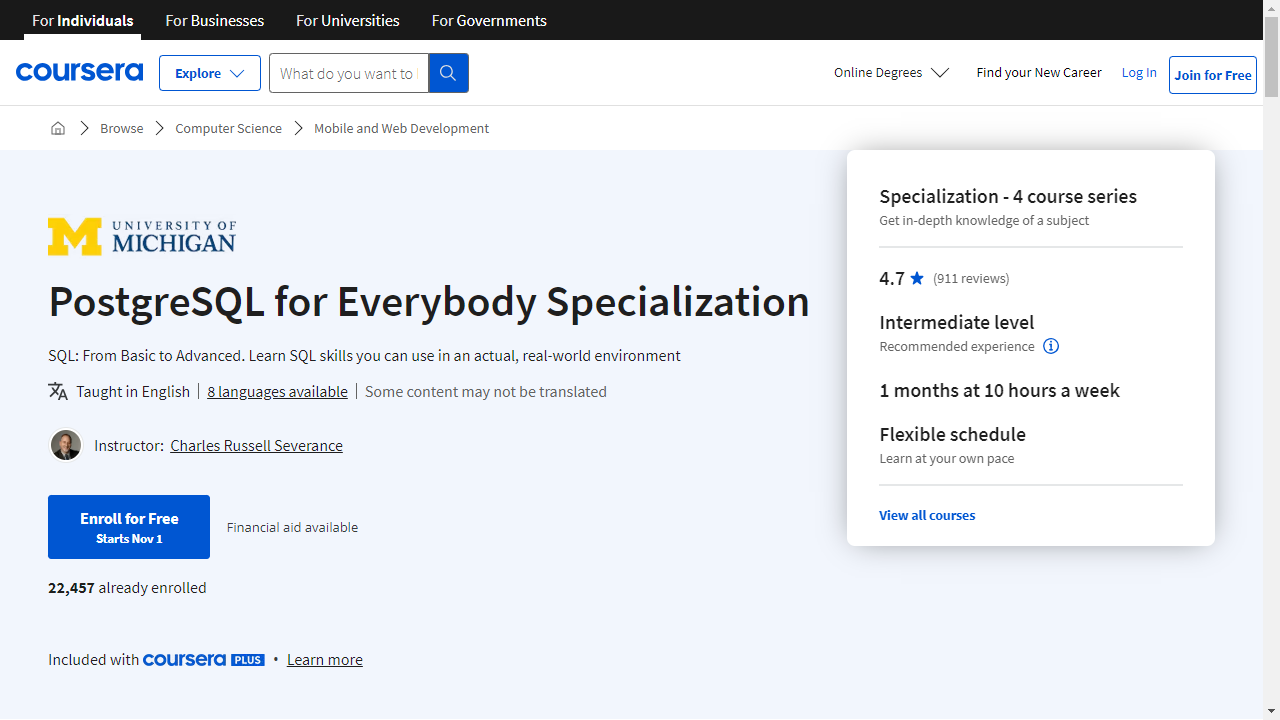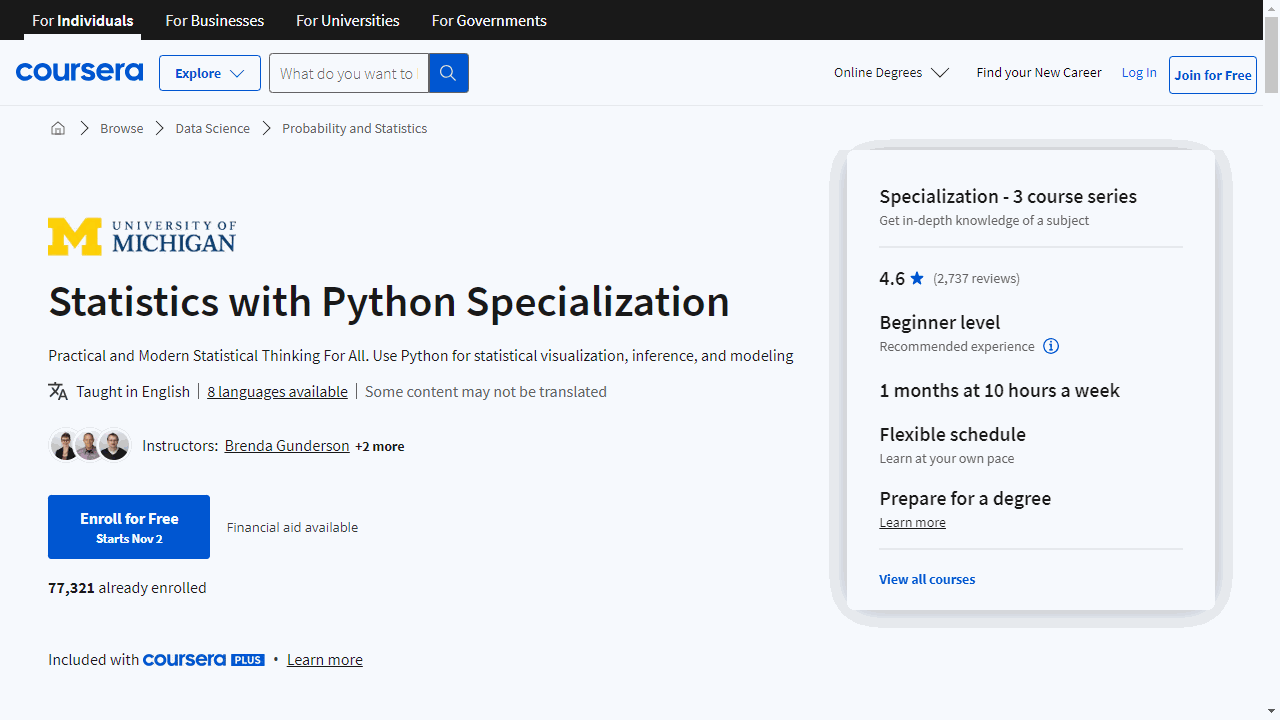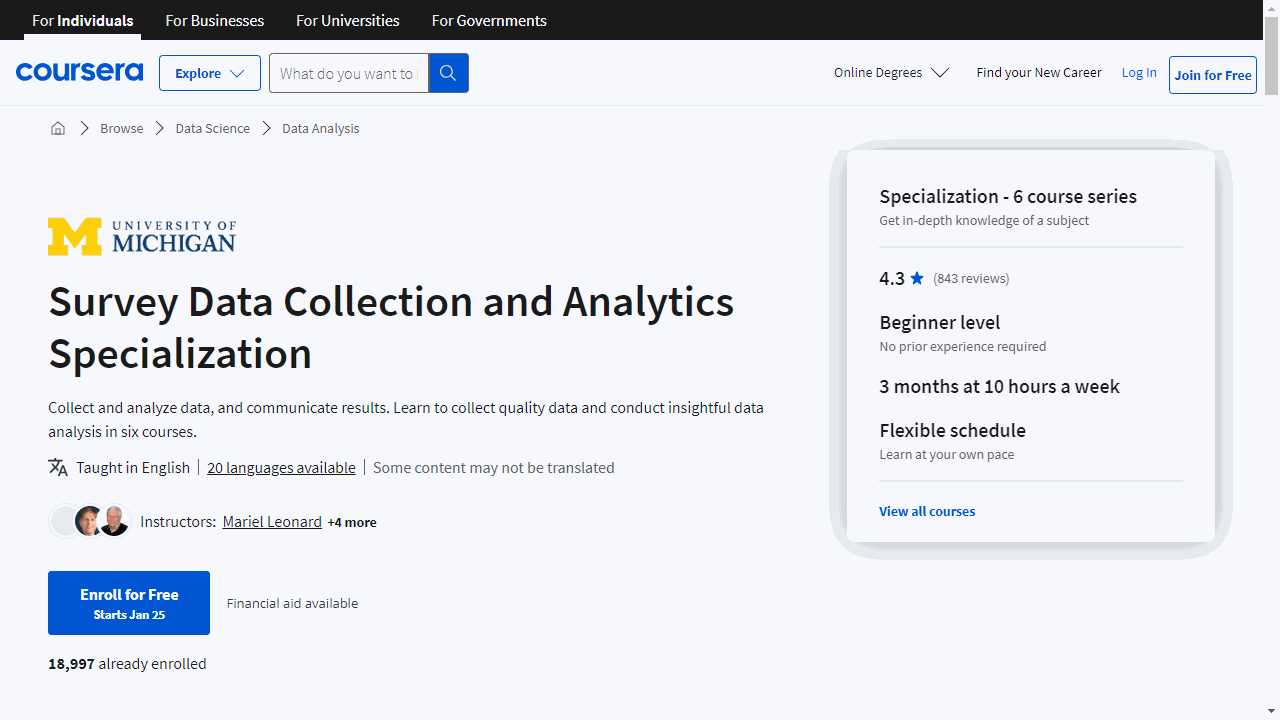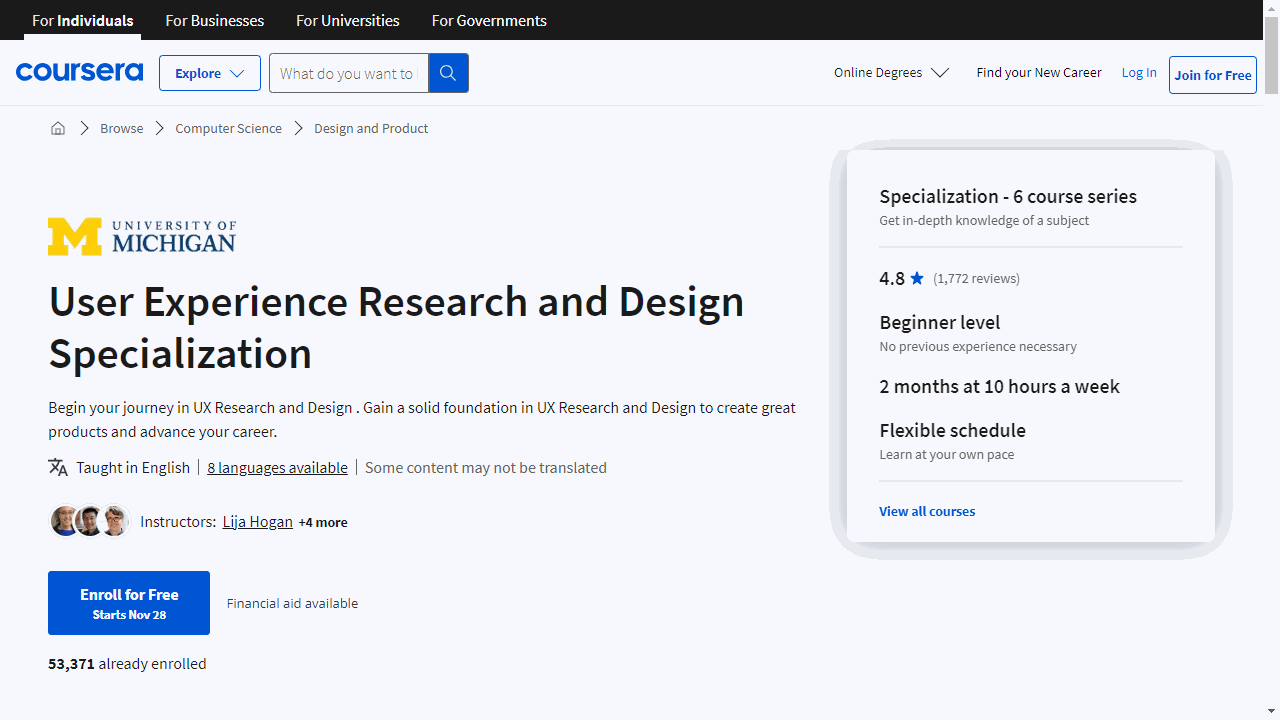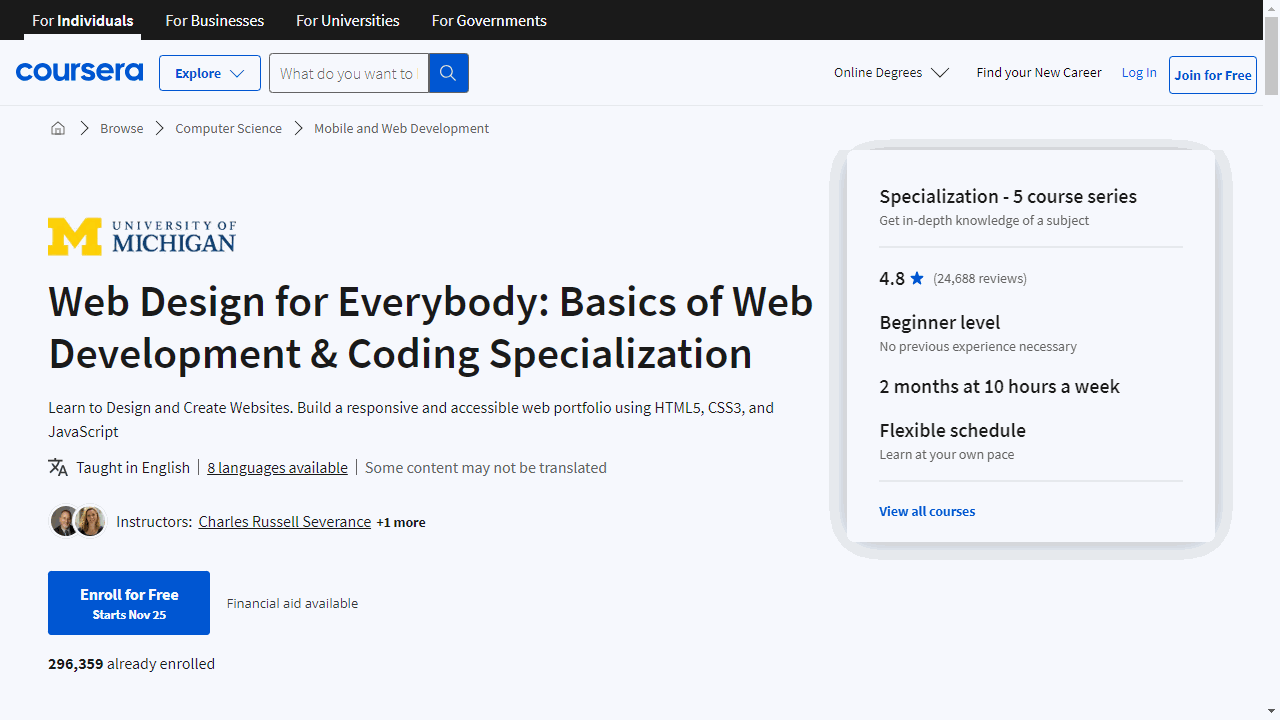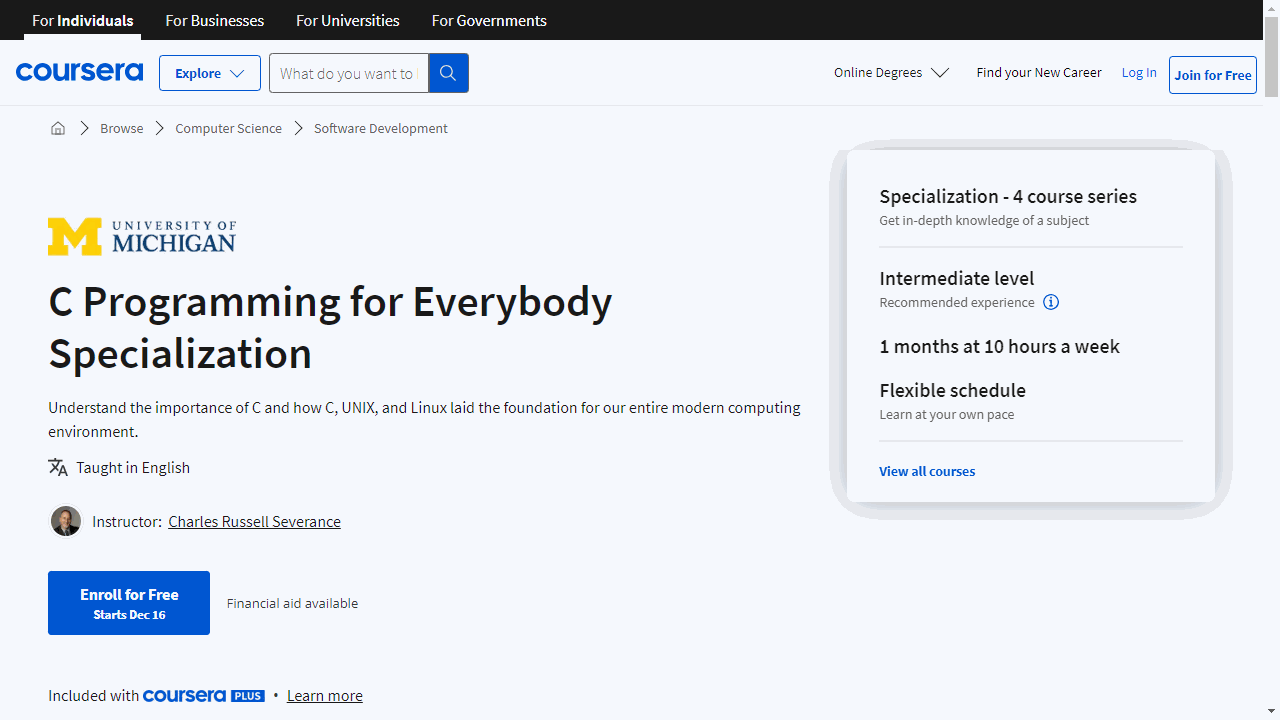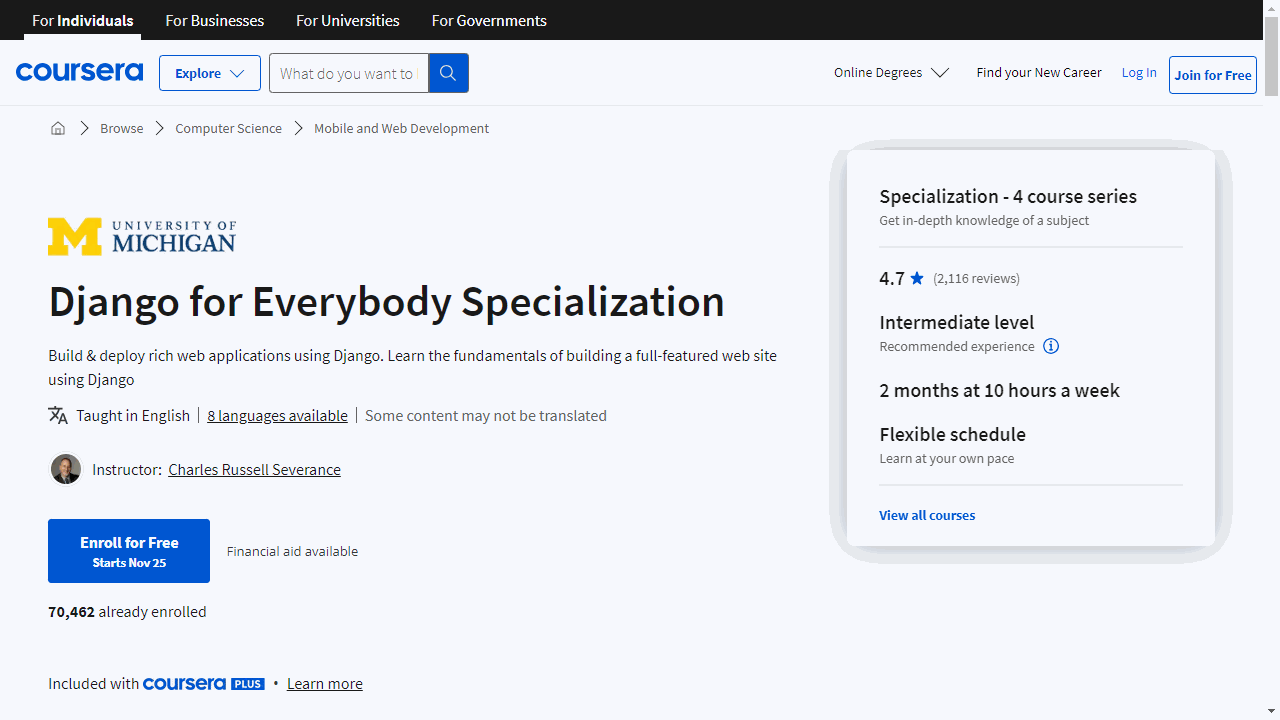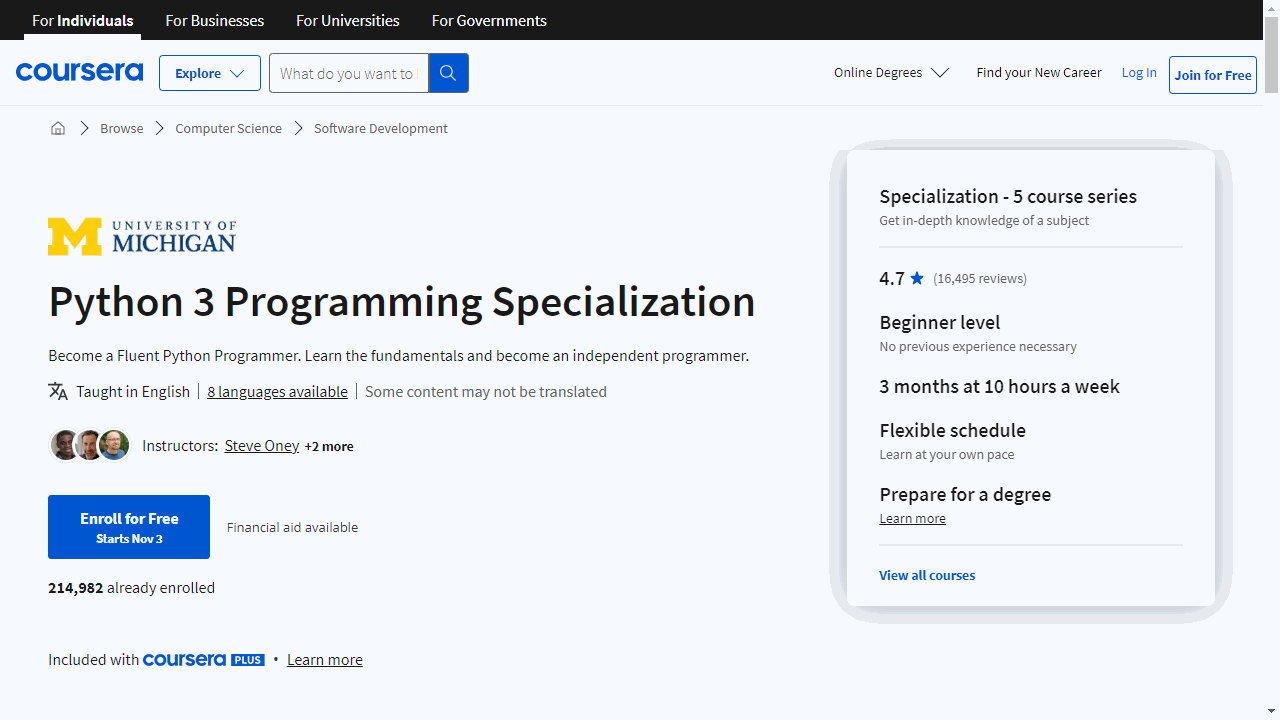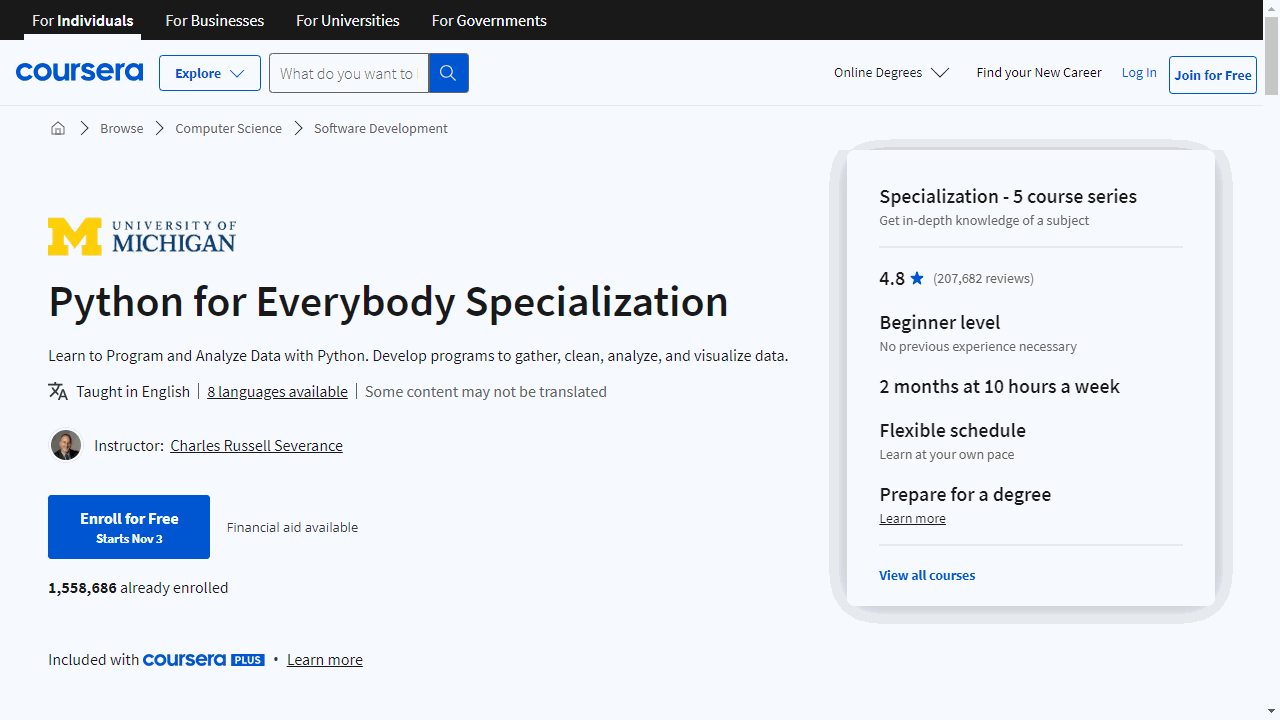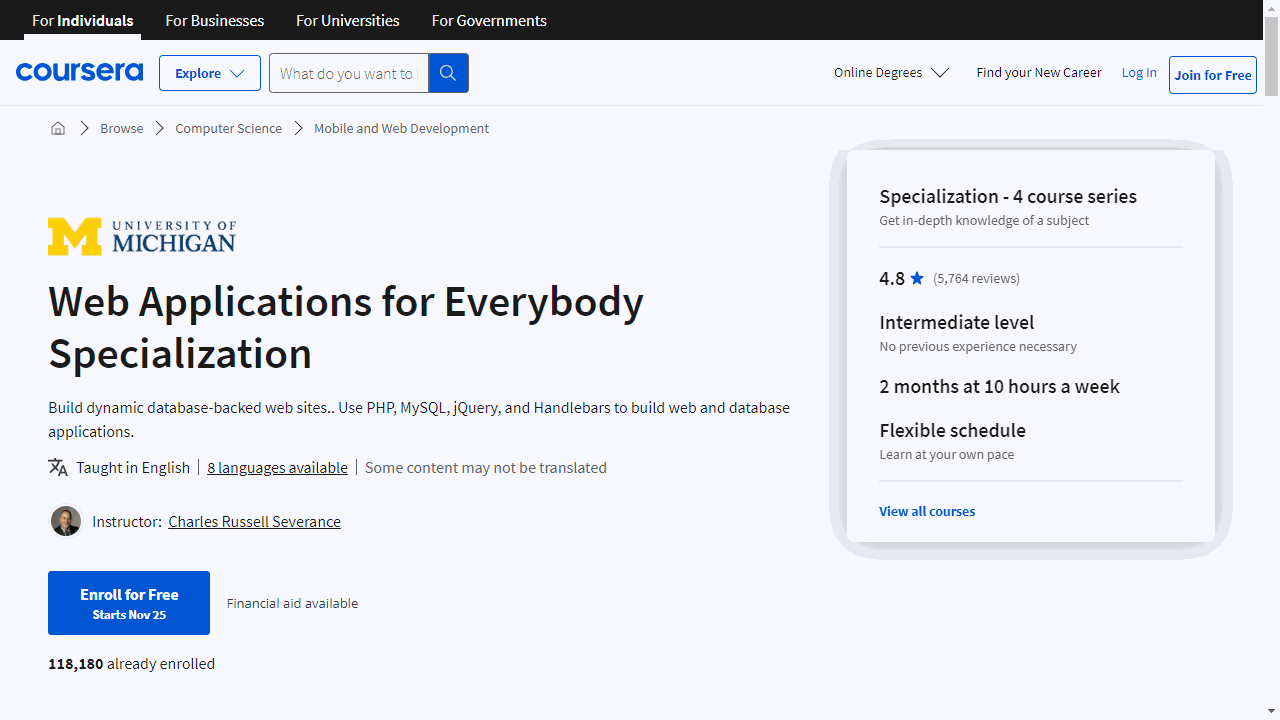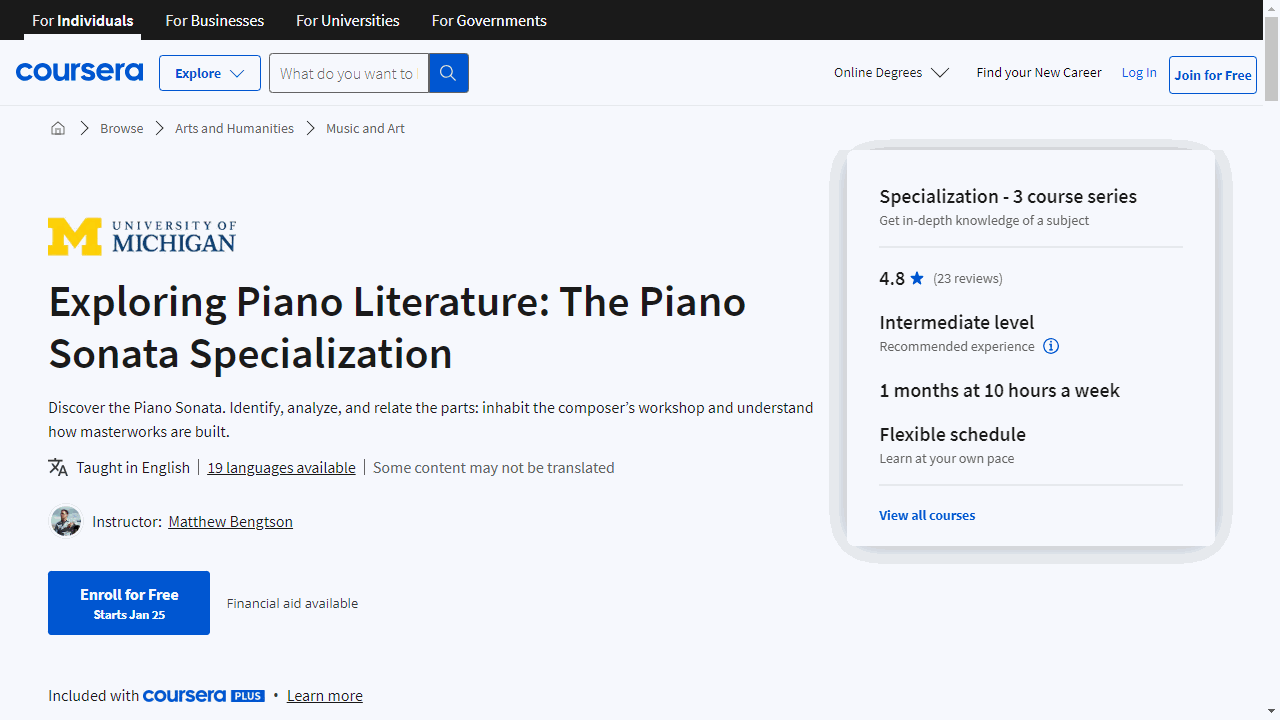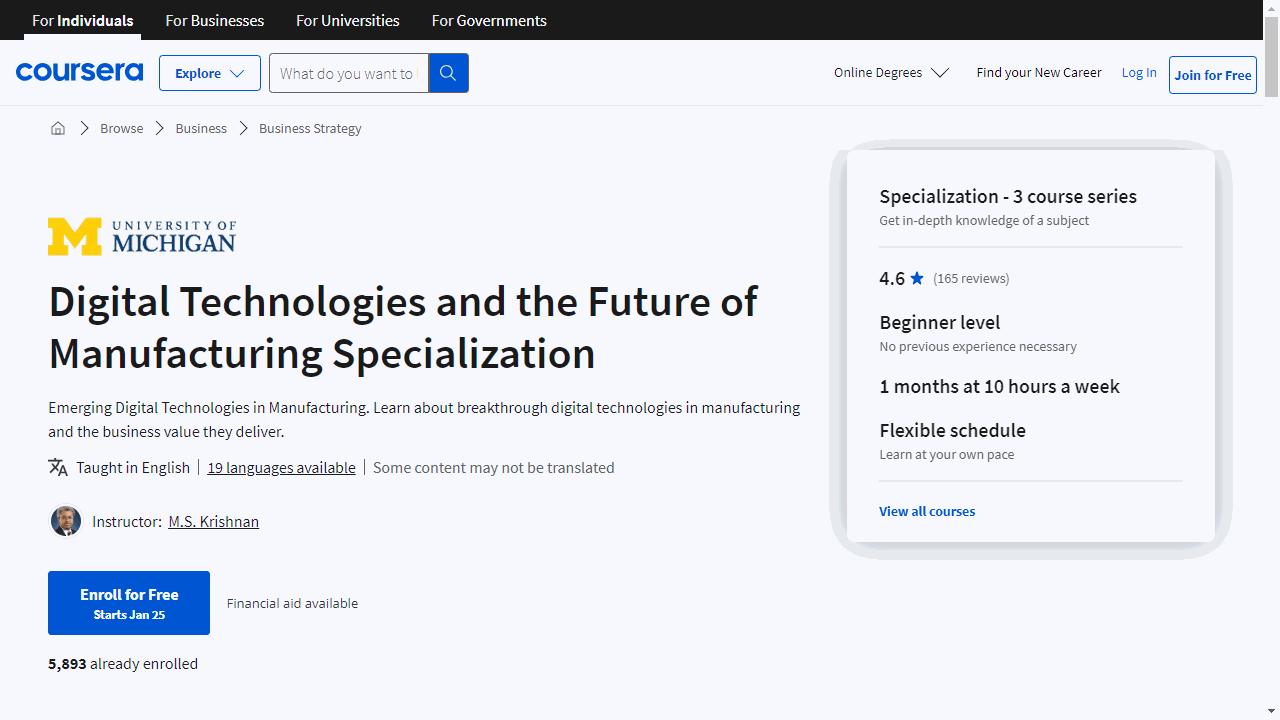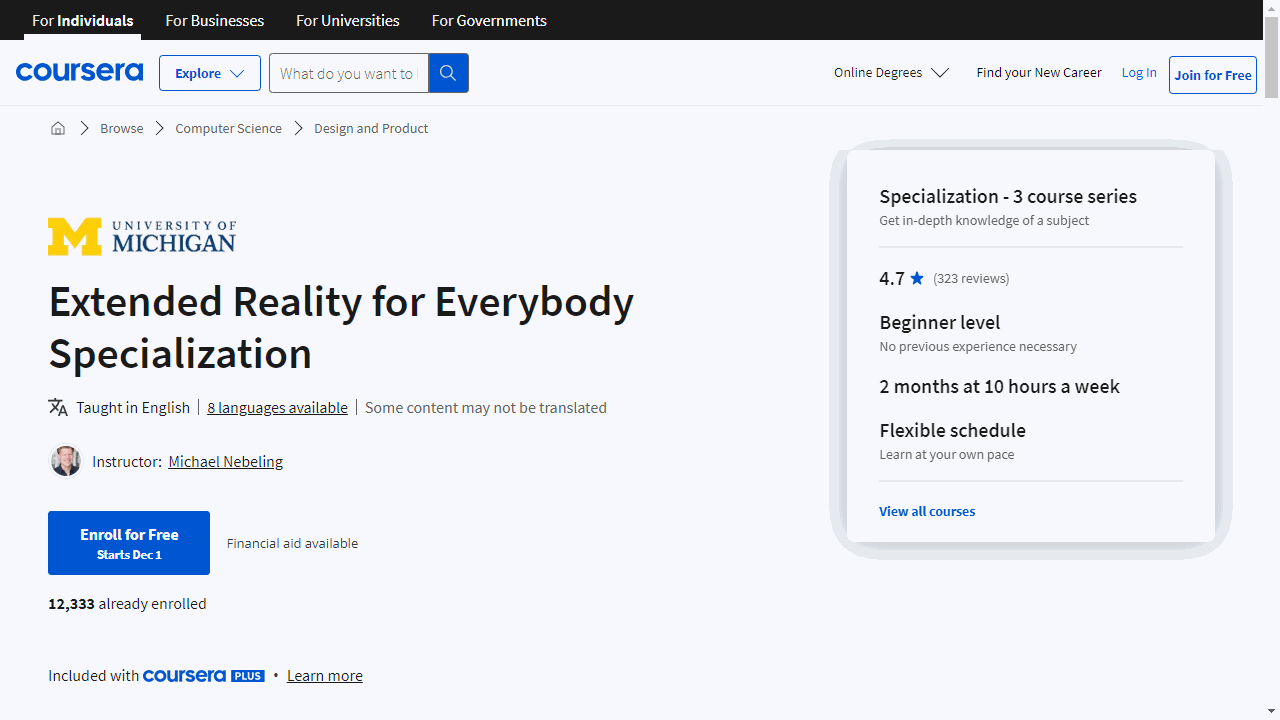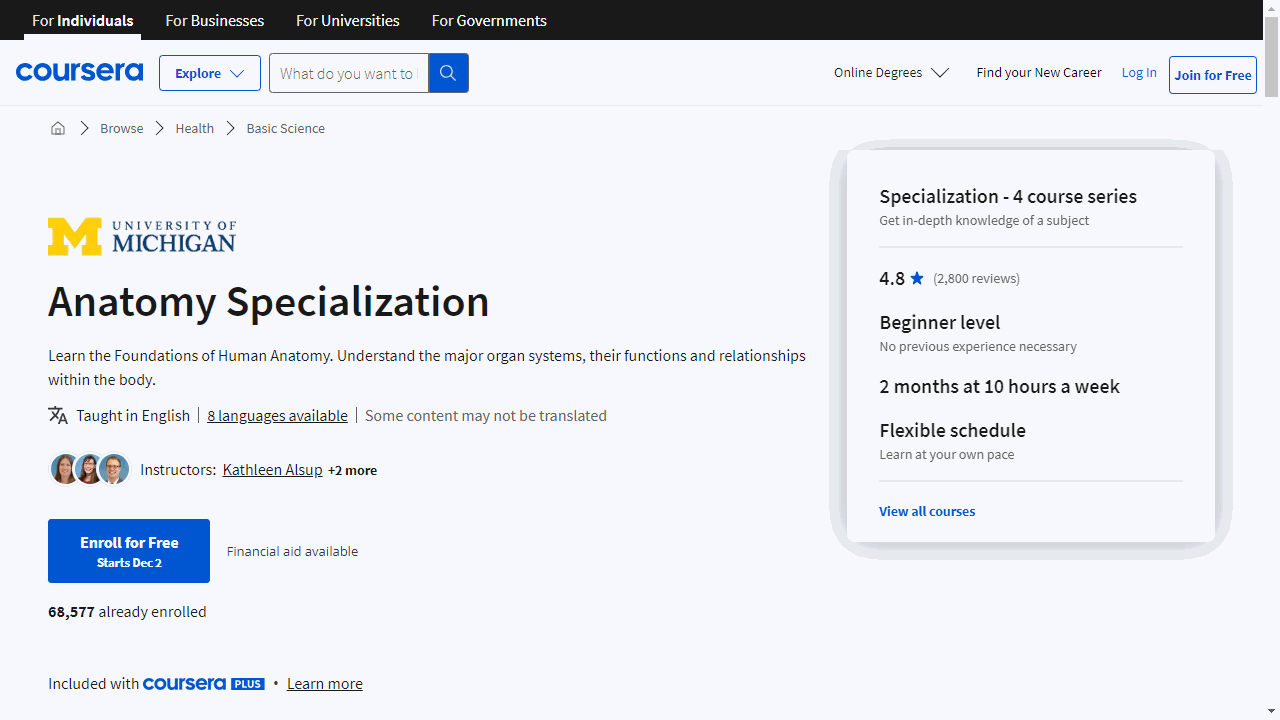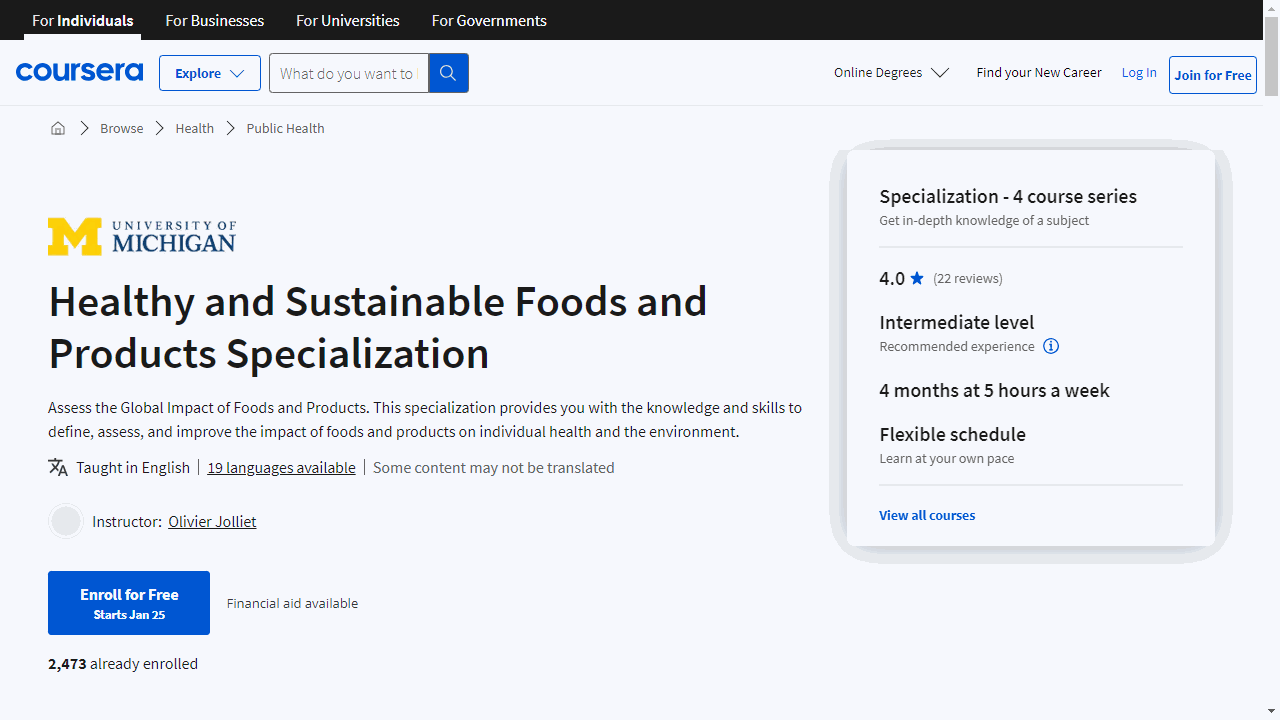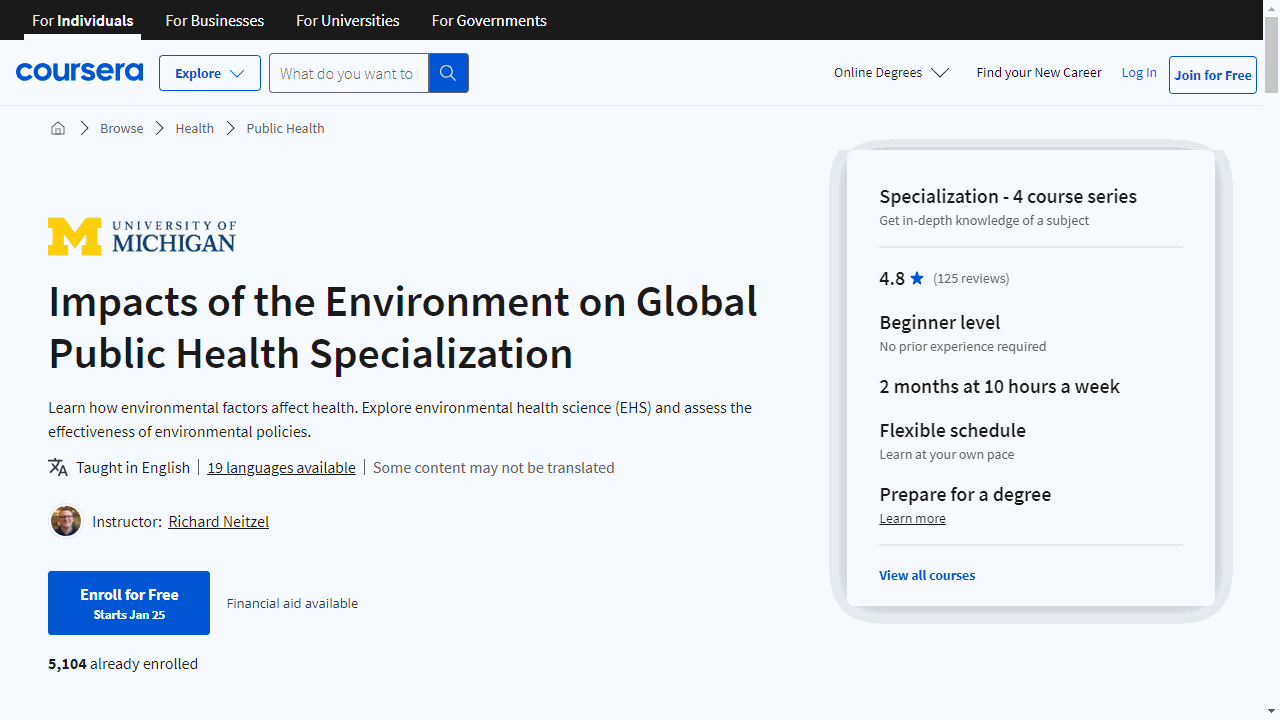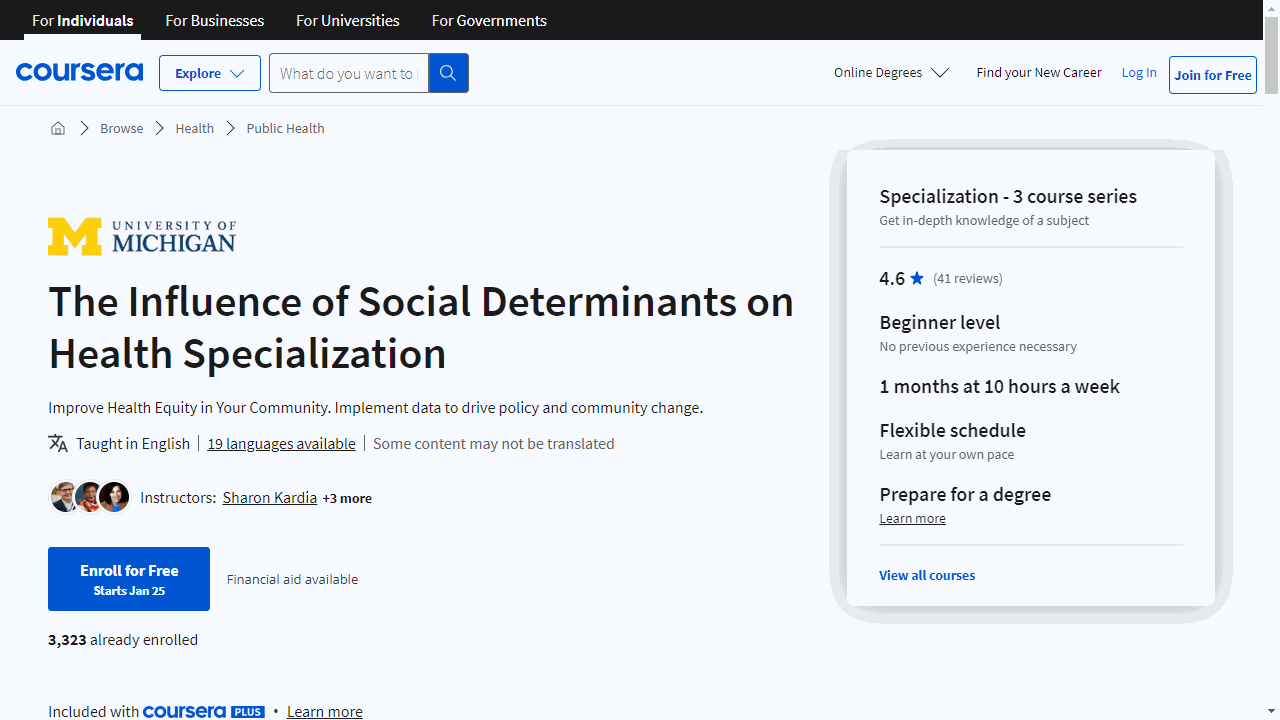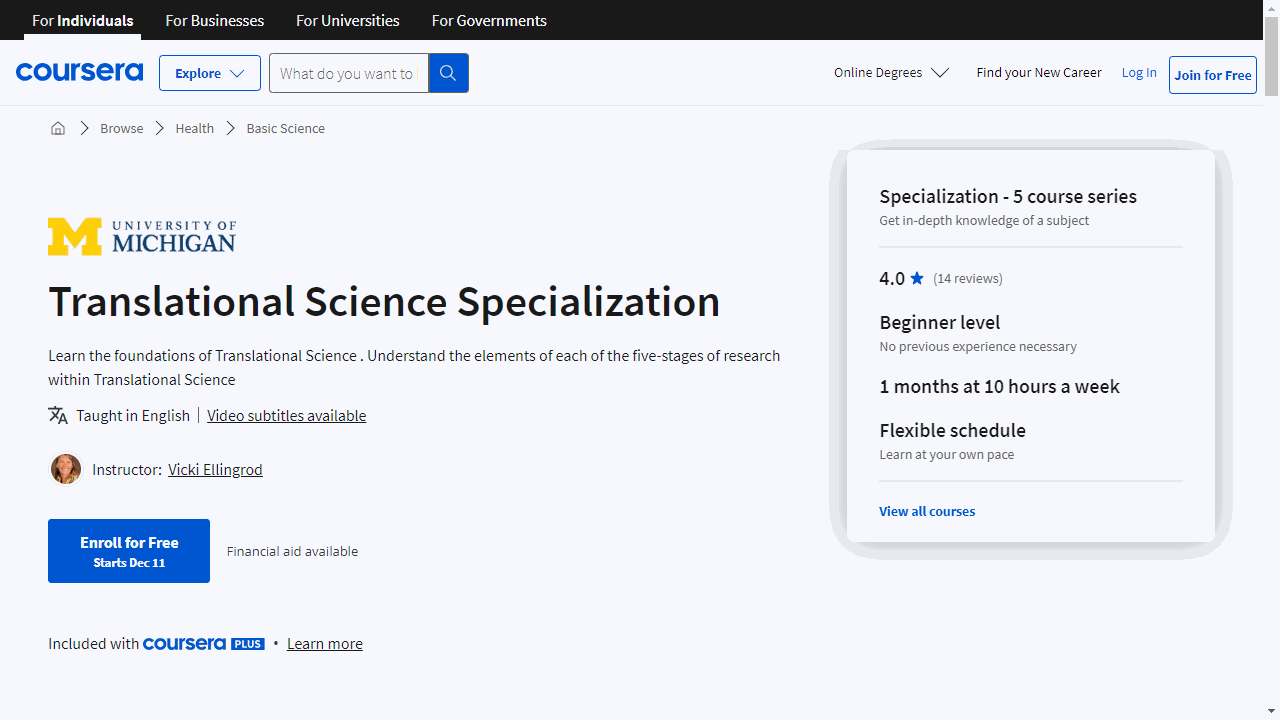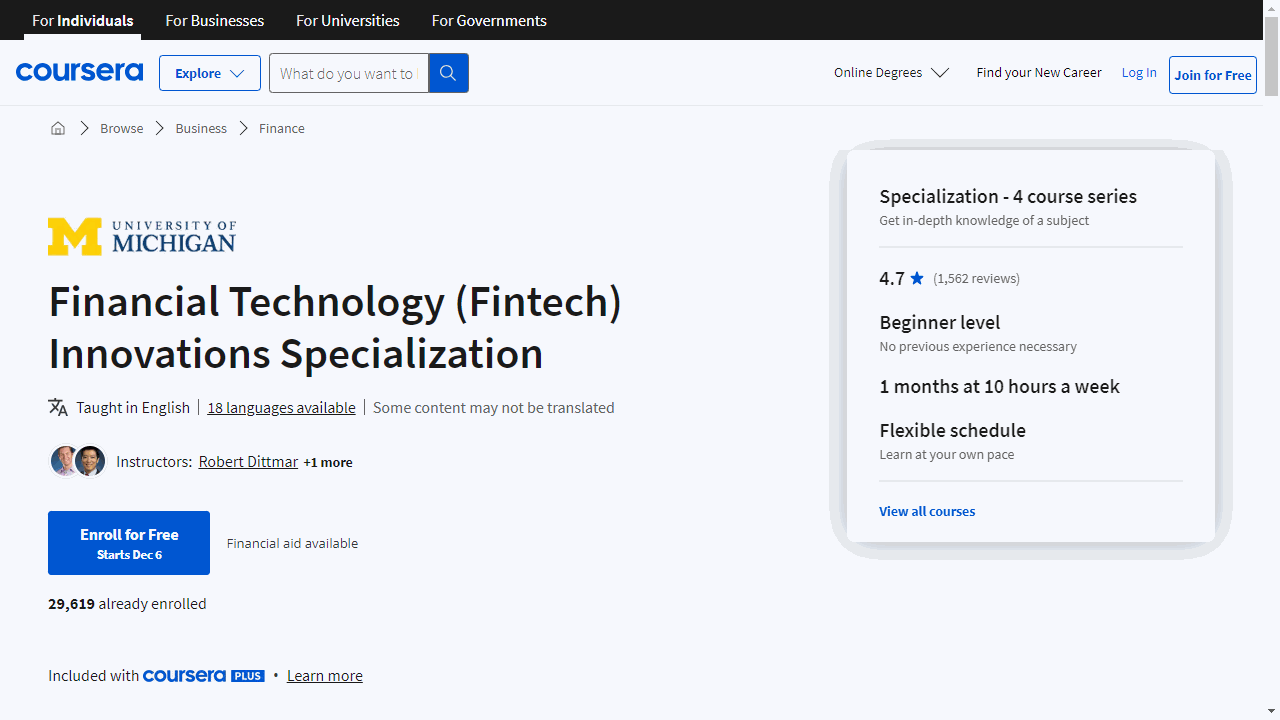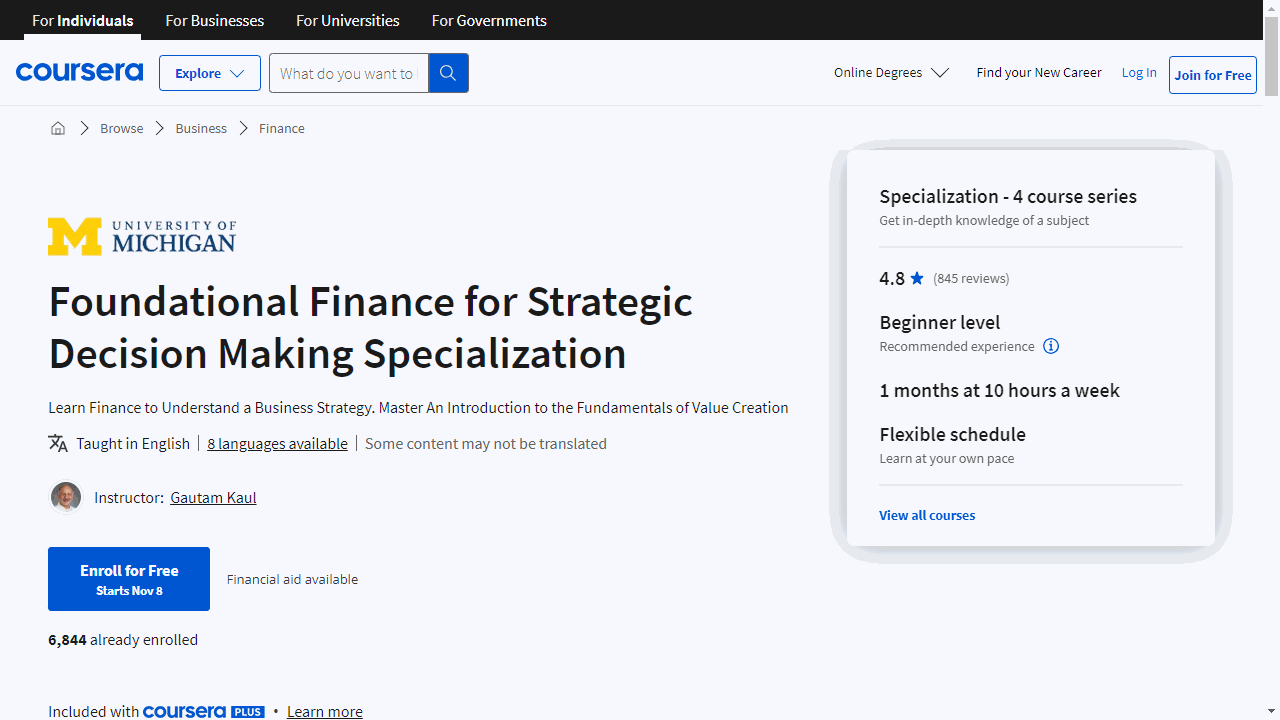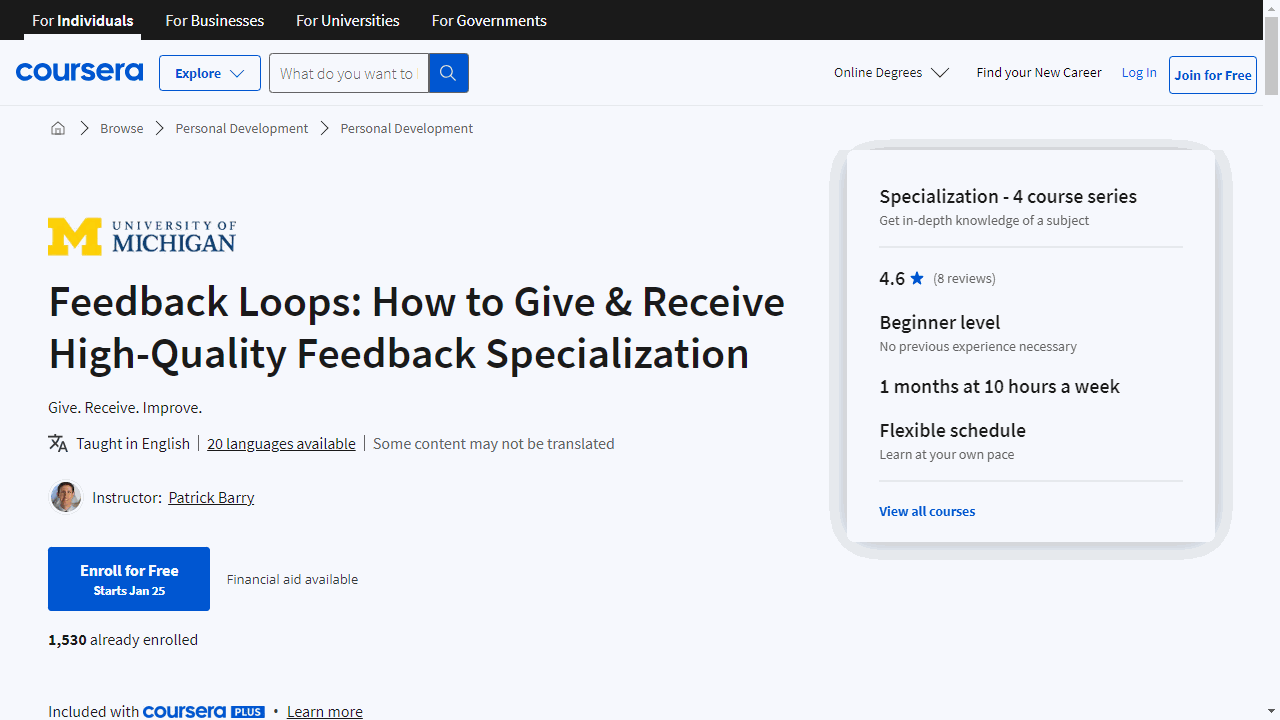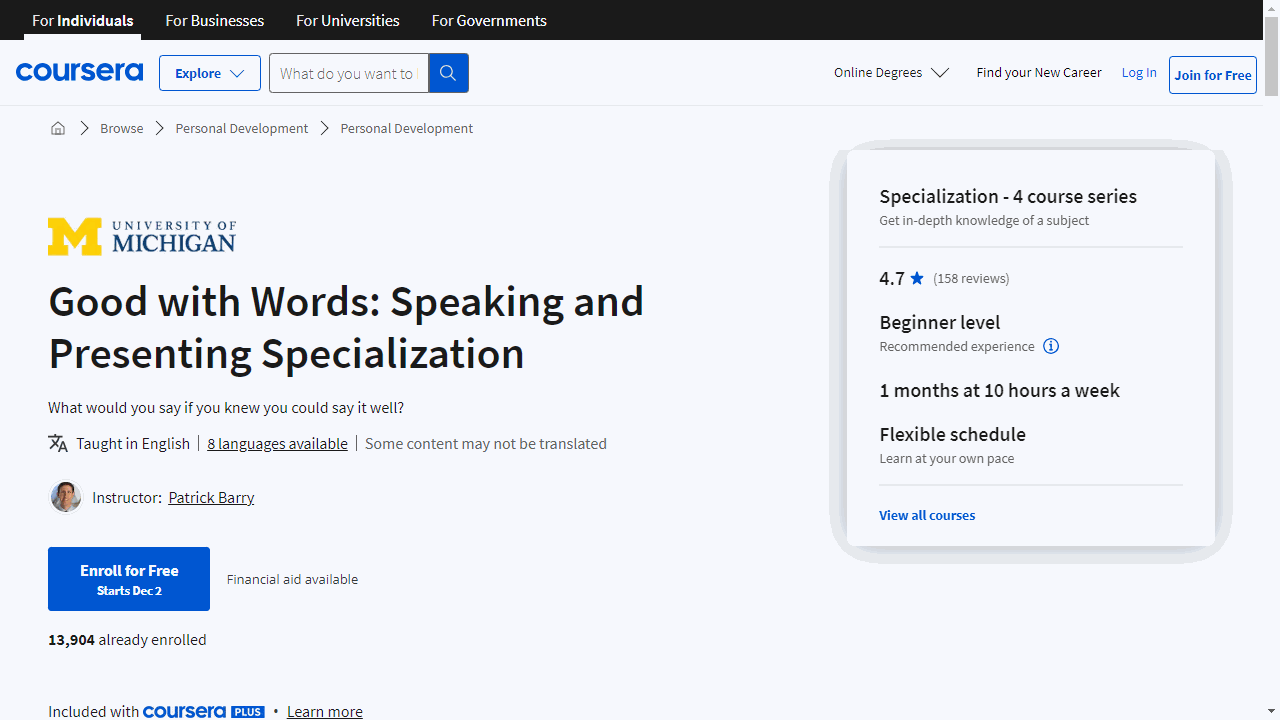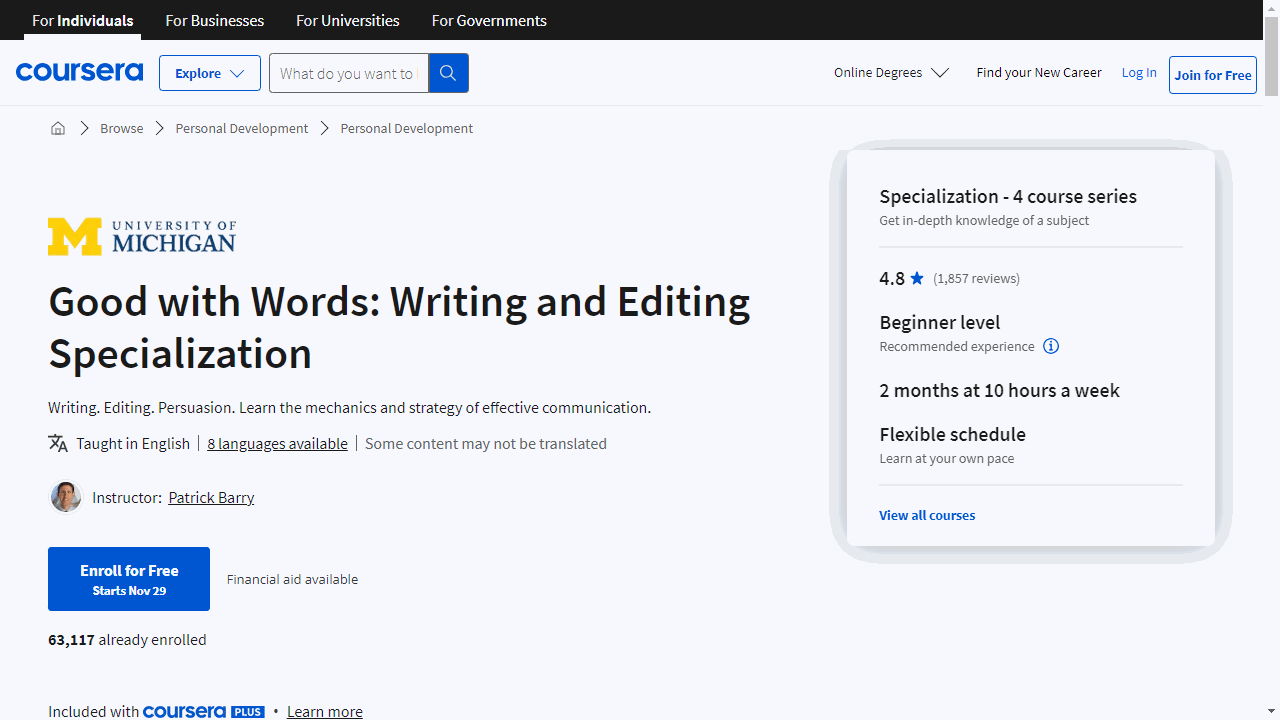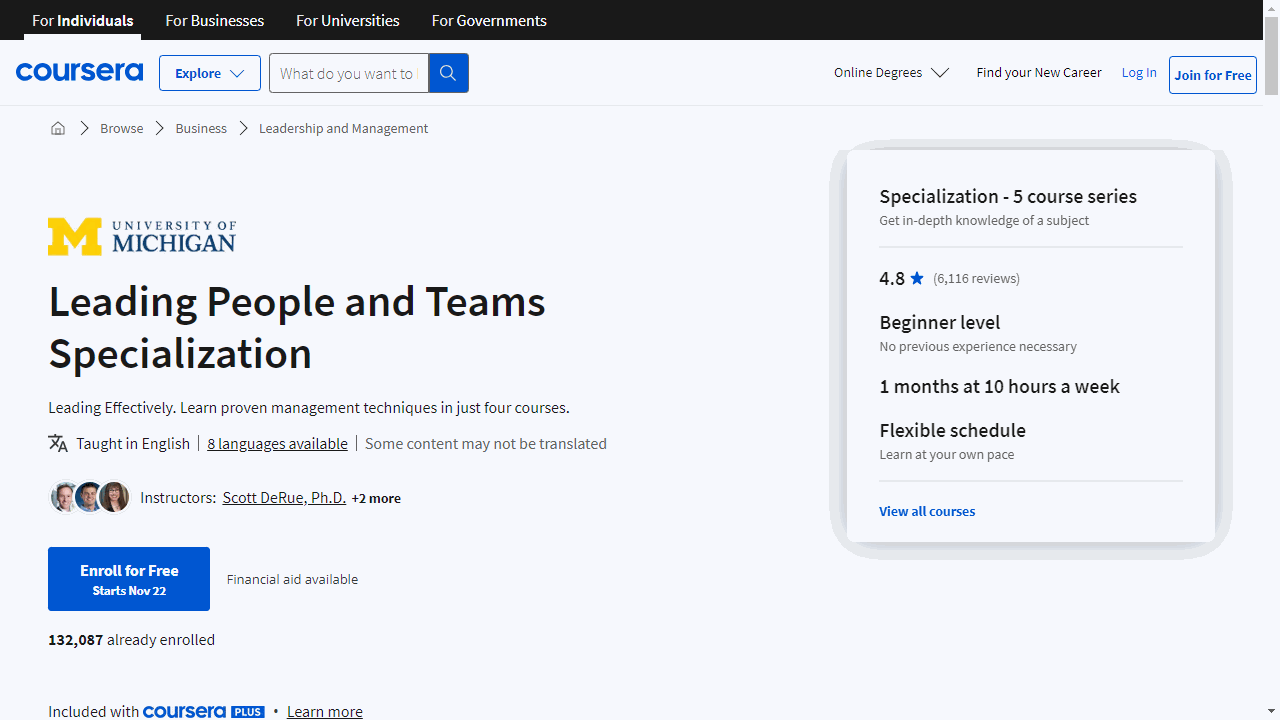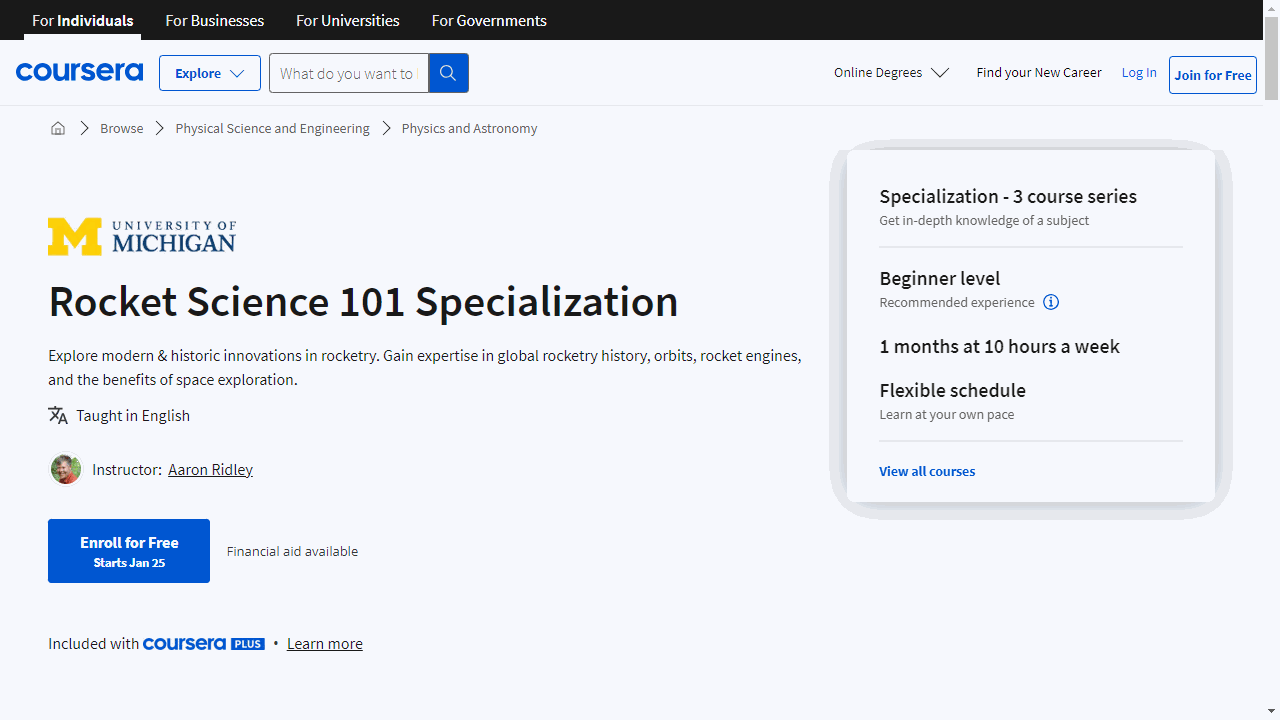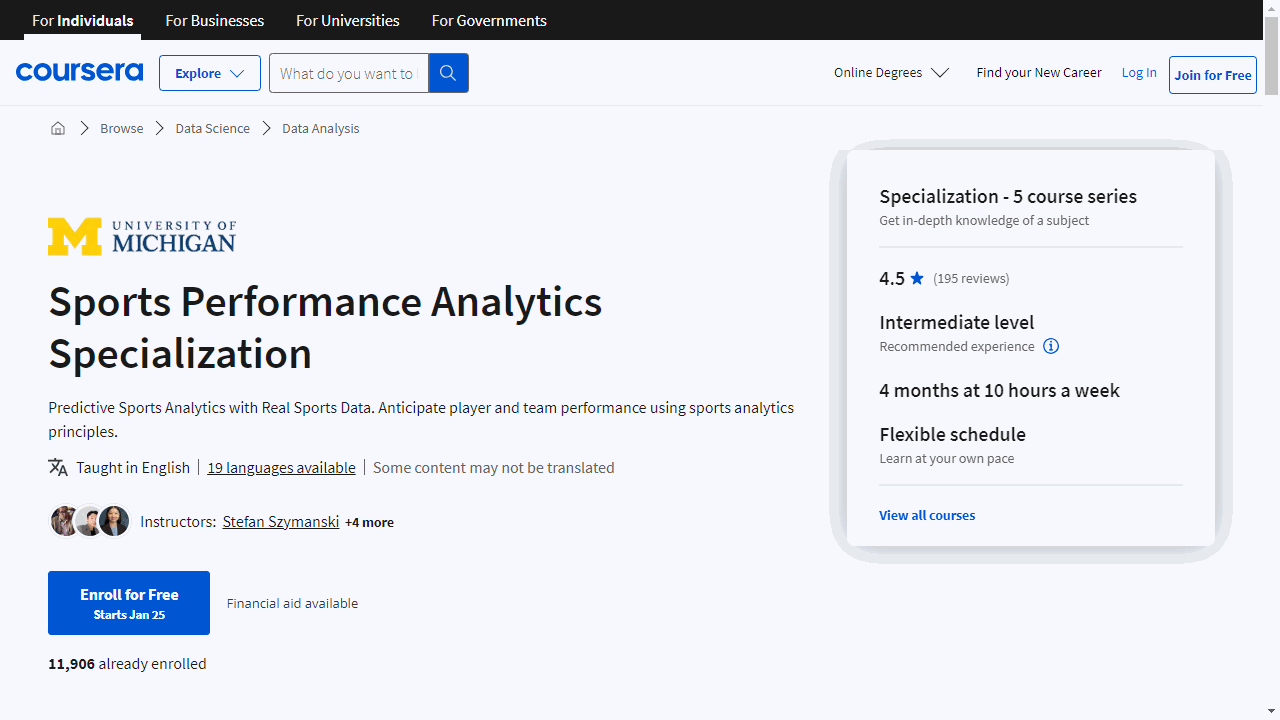Finding the right University of Michigan course on Coursera can be a daunting task, especially with so many options available.
You want a course that’s engaging, comprehensive, and taught by experts, but you also need to ensure it aligns with your learning style and goals.
For the best course overall, we recommend Applied Data Science with Python Specialization.
This specialization is highly regarded for its practical approach to data science, providing hands-on experience in Python, data manipulation, visualization, and machine learning.
It’s designed to equip you with the skills needed for a career in data science.
But if this isn’t quite what you’re looking for, don’t worry!
This list includes numerous options from the University of Michigan, covering a wide range of subjects, from programming and data analysis to healthcare, finance, and emerging technologies.
Keep reading to discover the perfect University of Michigan course for your needs.
Best Data Analysis Courses By University Of Michigan On Coursera
Applied Data Science with Python Specialization
Provider: University of Michigan
This series of courses equips you with the Python expertise needed for a career in data science.
Start with “Introduction to Data Science in Python,” where you’ll learn Python programming from the ground up.
You’ll get hands-on with lambdas, csv files, and the pandas library, setting a solid foundation for data manipulation and analysis.
Next up is “Applied Plotting, Charting & Data Representation in Python.”
This course sharpens your ability to create meaningful visualizations using matplotlib.
You’ll learn to distinguish between effective and ineffective charts and how to implement best practices in data visualization.
Once you’re comfortable with data visualization, “Applied Machine Learning in Python” introduces you to the core of machine learning.
You’ll move beyond theory, using the scikit-learn toolkit to develop predictive models.
This course emphasizes practical skills like cross-validation and feature engineering to avoid overfitting and enhance model performance.
For those with a passion for language, “Applied Text Mining in Python” delves into natural language processing (NLP).
You’ll gain proficiency in text manipulation and classification, employing the Natural Language Toolkit (NLTK) to extract insights from text data.
Finally, “Applied Social Network Analysis in Python” teaches you to analyze and visualize networks.
Through the NetworkX library, you’ll learn to measure node centrality and predict network evolution, skills essential for understanding complex relationships in data.
Data Analytics in the Public Sector with R Specialization
If you’re searching for a solid R programming course with a public sector focus, the “Data Analytics in the Public Sector with R Specialization” on Coursera is for you.
This series of courses is designed to build your skills progressively, starting with the “Fundamentals of Data Analytics in the Public Sector with R.”
Here, you’ll get a firm grasp on R programming basics and public administration concepts, learning to manipulate and analyze data with the tidyverse and dplyr package.
It’s a hands-on approach to understanding data within the context of the public sector.
Moving on, the course “Exploratory Data Analysis for the Public Sector with ggplot” teaches you to visualize data effectively.
You’ll master the art of creating informative and aesthetically pleasing visualizations using ggplot2, turning complex data sets into clear, communicative graphics.
This skill is crucial for presenting data in a way that’s both accessible and actionable.
The third course, “Assisting Public Sector Decision Makers With Policy Analysis,” takes your skills further into the realm of policy analysis.
You’ll apply your analytical prowess to real-world scenarios, evaluating the efficiency and effectiveness of policies using advanced statistical methods.
This course is particularly valuable for those looking to support decision-making processes with robust data analysis.
Lastly, “Politics and Ethics of Data Analytics in the Public Sector” provides a thoughtful examination of the ethical considerations in data analytics.
You’ll learn to navigate the complexities of data ethics and apply this knowledge in a capstone project, where you’ll perform a policy analysis using genuine data.
Each course builds on the last, ensuring a comprehensive learning experience.
All the while, you’ll work within RStudio on the Coursera platform, eliminating the need for additional software installations.
This specialization is more than just a set of R programming tutorials; it’s a pathway to becoming a competent data analyst in the public sector.
Data Science for Health Research Specialization
Provider: University of Michigan
If you’re aiming to harness the power of data in health research, these University of Michigan courses on Coursera will set you on the right path.
You’ll acquire the ability to format, analyze, and model data, paving the way for impactful insights in health outcomes.
Kick off your learning journey with “Arranging and Visualizing Data in R.” This course equips you with the essentials of the R statistical environment, guiding you through the setup of R and RStudio.
You’ll learn to navigate data manipulation with ease, preparing datasets for analysis by sorting, grouping, and summarizing.
The course also empowers you to create professional-level plots, ensuring your data isn’t just analyzed but also presented effectively.
Plus, you’ll establish a reliable workflow for your data projects.
Progress to “Linear Regression Modeling for Health Data” to unravel the complexities of statistical modeling.
This course demystifies the t-test and introduces you to linear regression, enabling you to interpret health data with multiple predictors accurately.
You’ll gain a solid foundation in statistical inference, learning to fit and interpret both simple and multiple regression models.
Then, “Logistic Regression and Prediction for Health Data” offers a focused look at binary outcomes in health research.
You’ll explore logistic regression, a key tool for estimating relationships between predictors and binary outcomes.
By the end of this course, you’ll confidently make and assess predictions, understanding the nuances of prevalence, risk ratios, and odds ratios.
Each course is designed with a blend of lectures, guided coding sessions, and independent exercises, ensuring you not only learn the concepts but also apply them practically.
You’ll emerge with a robust skill set in exploratory data analysis, statistical modeling, and predictive analytics using R.
Total Data Quality Specialization
Provider: University of Michigan
Say goodbye to unreliable data and hello to confidence in your analysis!
This set of courses is designed to ensure that your data is reliable and accurate before you start analyzing it.
Dive into “The Total Data Quality Framework” and learn to distinguish between designed and gathered data.
You’ll master the TDQ Framework, understanding its key dimensions and why it’s crucial to assess your data’s quality.
This knowledge is foundational for anyone working with data, ensuring you don’t waste time on flawed analysis.
Move on to “Measuring Total Data Quality,” where you’ll get hands-on with metrics that evaluate your data’s health.
You’ll create a concept map to visualize data quality and discover software tools that measure it effectively.
This course equips you with the skills to make informed decisions about the quality of your data.
Then, “Design Strategies for Maximizing Total Data Quality” teaches you to proactively improve your data.
You’ll explore strategies to enhance data quality, whether it’s data you’ve created or sourced.
By the end of this course, you’ll be adept at designing data collection processes that prioritize quality.
Throughout this specialization, you’ll gain practical skills in data analysis, classification, and the use of computation software.
You’ll learn from the University of Michigan’s experts, ensuring your data is of the highest quality before any analysis takes place.
PostgreSQL for Everybody Specialization
This series of courses is designed to take you from a beginner to an advanced level in SQL and PostgreSQL, a popular open-source relational database management system.
The first course, “Database Design and Basic SQL in PostgreSQL” covers the historical design of databases and the use of SQL in the PostgreSQL environment.
You’ll learn how to create tables, define the schema of your data, and represent one-to-many and many-to-many relationships. The course also includes hands-on assignments, which are a great way to apply what you’ve learned.
Next up is “Intermediate PostgreSQL.”
This course dives deeper into SQL techniques, covering aggregation, transactions, reading and parsing CSV files, and more. You’ll also learn how PostgreSQL handles and indexes text data.
The third course, “JSON and Natural Language Processing in PostgreSQL,” is a standout.
It’s unique in that it focuses on how PostgreSQL creates and uses inverted indexes for JSON and natural language content. You’ll get to work with various sources of data, including online APIs, and build your own inverted indexes.
The final course, “Database Architecture, Scale, and NoSQL with Elasticsearch,” explores database architecture, PostgreSQL, and scalable deployment configurations.
You’ll learn about Elasticsearch NoSQL, a common NoSQL database used for high-speed search and indexing.
Best Statistics Courses By University Of Michigan On Coursera
Statistics with Python Specialization
This hands-on program, offered by the University of Michigan, gives you a solid foundation in statistical concepts and techniques using the powerful Python programming language.
In the first course, Understanding and Visualizing Data with Python, you’ll learn how to wrangle and visualize various data types in Python using libraries like Numpy, Pandas, and Matplotlib.
Also how to identify the right visuals and summaries for univariate, multivariate, probability, and non-probability data samples.
By the end, you’ll confidently communicate statistical ideas through data visualizations.
Next up is Inferential Statistical Analysis with Python where you’ll move from summarizing data to making inferences and assessing theories through statistical testing.
Here you will master confidence intervals, hypothesis testing, and interpreting results using real-world case studies.
The specialization culminates in Fitting Statistical Models to Data with Python.
Go beyond inference to fitting versatile statistical models like linear regression, logistic regression, and Bayesian models.
The hands-on projects give you practice generating predictions and discovering insights from real data sets.
The program’s unique blend of conceptual learning and practical coding skills prepares you for data analytics roles or more advanced study.
Survey Data Collection and Analytics Specialization
Provider: University of Michigan
If you’re ready to become proficient in survey data collection and want to learn from Michigan’s finest, this specialization is for you.
Start with “Framework for Data Collection and Analysis” to navigate the data landscape confidently.
You’ll learn to match data sources with research questions, create an analysis plan, and evaluate data quality using real-world examples from industry and government.
In “Data Collection: Online, Telephone and Face-to-face,” you’ll compare survey methods and their impact on data integrity.
This course goes beyond basics, delving into the nuances of survey design and how choices like mode and format can influence results.
“Questionnaire Design for Social Surveys” hones in on crafting effective questionnaires.
You’ll grasp the essentials of question design and evaluation, ensuring your surveys accurately capture the information you need.
“Sampling People, Networks and Records” introduces you to the science of sampling.
You’ll differentiate between sampling methods, understand the principles of probability sampling, and learn how to select samples that bolster the credibility of your research.
If you encounter gaps in data, “Dealing With Missing Data” offers strategies for adjusting surveys and calibrating results.
You’ll explore techniques like imputation and learn how to use statistical software packages to manage missing information.
Finally, “Combining and Analyzing Complex Data” teaches you to synthesize and analyze data using survey weights and regression models.
You’ll also navigate the ethical considerations of data linkage and the legalities of informed consent across different countries.
With this specialization, you’ll gain practical skills in survey design, data quality, and analysis, using tools like SAS®, Stata®, and R®.
Best Design Courses By University Of Michigan On Coursera
User Experience Research and Design Specialization
Starting with “Introduction to User Experience Principles and Processes,” you’ll get a solid grounding in UX research and design.
This course emphasizes the importance of iterative learning, equipping you with the ability to conduct user interviews, analyze design principles, and create prototypes that evolve based on user feedback.
In “Understanding User Needs,” the focus shifts to qualitative research methods.
You’ll learn to conduct semi-structured interviews and observations, using tools like affinity walls to distill user data into actionable insights.
This course is crucial for grasping the nuances of user behavior and translating them into design requirements.
“Evaluating Designs with Users” teaches you to validate your designs through user testing.
You’ll discover various testing methods, design effective tests, and learn to interpret the results to refine your designs.
This course is about ensuring your designs resonate with users and meet their needs effectively.
“UX Design: From Concept to Prototype” is where creativity meets practicality.
You’ll learn to define design problems, create user stories, and transform these into visual designs and prototypes.
This hands-on course is all about bringing your UX concepts to life and preparing them for real-world application.
For those interested in data-driven design, “UX Research at Scale: Surveys, Analytics, Online Testing” offers insights into gathering user feedback on a larger scale.
You’ll explore web analytics, A/B testing, and remote testing to understand user attitudes and behaviors across a broader audience.
Lastly, the “UX (User Experience) Capstone” allows you to apply everything you’ve learned in a comprehensive project.
From conducting research to designing and testing a product, this capstone project is your opportunity to demonstrate your UX expertise in a practical setting.
Each course is rich with relevant skills, from user research and human-computer interaction to prototyping and analytics.
Web Design for Everybody: Basics of Web Development & Coding Specialization
Starting with “Introduction to HTML5,” you’ll grasp the essentials of web structure, learning to create pages with text, links, and images.
It’s a practical first step, ensuring you understand the building blocks of web content.
Next, “Introduction to CSS3” teaches you to style your web pages.
You’ll learn to write CSS rules that control layout, fonts, and colors, transforming basic HTML into visually appealing designs.
The course emphasizes accessibility, ensuring your designs are usable by all.
“Interactivity with JavaScript” introduces you to dynamic web development.
You’ll explore JavaScript basics, from variables to functions, and use the DOM to make your pages respond to user actions.
The course culminates in building an interactive form, a skill crucial for engaging websites.
“Advanced Styling with Responsive Design” is where your skills expand to accommodate the diverse range of devices used to access the web today.
You’ll tackle mobile-first design and learn to use media queries, ensuring your sites are flexible and accessible across all platforms.
The “Web Design for Everybody Capstone” is the final challenge, where you’ll apply your new skills to create a responsive web portfolio.
This project solidifies your learning and gives you a tangible asset to showcase your abilities.
You’ll emerge with the skills to create accessible, responsive websites, ready to tackle real-world projects.
Best Programming Courses By University Of Michigan On Coursera
C Programming for Everybody Specialization
Provider: University of Michigan
This Coursera Specialization guides you through the essentials of C programming, a language that’s fundamental to the development of many critical systems like operating systems and databases.
Start with “Exploring C” to grasp the historical impact of C and its basic syntax.
You’ll compare C with Python, understanding their similarities and differences, and appreciate C’s role in the evolution of programming.
In “Programming in C,” you’ll delve into C’s syntax, mastering variables, control flow, and the art of writing recursive functions.
This course empowers you to craft algorithms with precision and efficiency.
“Data Structures in C” introduces you to the management of complex data through dynamic memory allocation, pointers, and structures.
You’ll tackle memory optimization and learn to navigate the intricacies of C’s data handling capabilities.
Finally, “Building Objects in C” bridges the gap between procedural and object-oriented programming (OOP).
You’ll construct a library capable of managing advanced data structures and gain insights into memory allocation and the lifecycle of objects in C.
As you progress, you’ll acquire skills in memory management, understand the nuances of control flow, and develop the ability to create robust recursive functions.
You’ll also become aware of security considerations unique to C programming.
By the end of this specialization, you’ll not only have a deep understanding of C’s syntax and structures but also the competence to apply these concepts to build efficient, secure programs.
Django for Everybody Specialization
Django is a very popular Python framework for building web applications.
In this specialization, you’ll learn to use Django to create dynamic websites, from simple webpages to sophisticated applications.
This series begins with “Web Application Technologies and Django,” where you’ll grasp the essentials of web communication through HTTP and craft web pages with HTML and CSS.
It’s a practical introduction, setting the foundation for web development and culminating in deploying your first Django app.
Progressing to “Building Web Applications in Django,” you’ll delve into Django’s database interactions, employing Object-Relational Mapping (ORM) for efficient data handling.
This course sharpens your skills in Python’s Object-Oriented programming and SQL, empowering you to construct robust data models and manage application objects with Django’s tools.
“Django Features and Libraries” elevates your skill set by introducing user authentication, session management, and enhancing the user interface of your applications.
You’ll apply these concepts in a real-world project, developing a classified ads website that addresses common web development challenges.
The final course, “Using JavaScript and JSON in Django,” brings dynamic capabilities to your toolkit.
You’ll learn to use JavaScript and jQuery for responsive, interactive web elements, and JSON for seamless data exchange between server and client.
Python 3 Programming Specialization
Provider: University of Michigan
The Python 3 Programming Specialization is a top-rated series of five courses designed specifically for beginners with no prior experience.
Through hands-on exercises and engaging video lectures, you’ll gain a strong foundation in Python, one of the most popular and in-demand programming languages today.
The courses progressively build your skills, starting with Python basics like data structures, conditional logic, and loops before advancing to more complex topics like file I/O, APIs, and object-oriented programming.
The specialization emphasizes practical coding skills you can apply right away.
You’ll get lots of practice debugging code and building real-world projects like a social media data analyzer and an image processing application.
The final course lets you integrate APIs and libraries like Tesseract and OpenCV into impressive portfolio projects covering detecting faces and extracting text from images.
With over 150,000 enrollments, this specialization has proven effective for absolute beginners.
The courses stick to simple explanations and avoid unnecessary jargon. Skilled instructors guide you every step of the way with clear examples and hands-on exercises. You’ll build key programming abilities through repetition and experimentation.
Python for Everybody Specialization
The Python for Everybody Specialization, offered by the University of Michigan, is a fantastic option for beginners wanting to learn Python.
This specialization covers everything you need to go from no coding experience to building real-world programs and applications. The courses use Python, which is one of the most popular and in-demand programming languages today.
The first course teaches you Python basics like variables, expressions, loops, and functions. You’ll write your first programs and learn key concepts needed for the rest of the specialization.
The next courses dive into essential Python skills like data structures, file input/output, web scraping, databases, and data visualization. Each course builds on the last, taking you from beginner to intermediate Python programmer.
By the end, you’ll be able to scrape data from websites, build databases, clean and process data, and create data visualizations.
The capstone project lets you apply everything you’ve learned by building your own data visualization application.
The courses use hands-on examples and exercises to reinforce concepts. You’ll get experience writing and running Python code yourself, which is the best way to learn.
The instructor, Dr. Charles, is highly engaging and enthusiastic.
He explains things clearly and simply, even for total beginners. Many students find his teaching style entertaining and motivating.
The Python for Everybody Specialization is the top choice for beginners starting out in programming.
Web Applications for Everybody Specialization
This series of courses by the University of Michigan is crafted to guide you through the essentials of web development, ensuring you build a solid foundation and advance to more complex concepts with ease.
Starting with “Building Web Applications in PHP,” you’ll grasp how web browsers and servers interact.
You’ll delve into PHP, HTML, and CSS, equipping you with the skills to create interactive and visually appealing websites.
Additionally, you’ll become proficient in using XAMPP or MAMP, essential tools for any web developer’s arsenal.
The “Introduction to Structured Query Language (SQL)” course demystifies data management.
You’ll learn to navigate SQL’s syntax, design databases with multiple tables, and understand complex relationships.
This knowledge is crucial for handling the vast amounts of data that modern web applications manage.
In “Building Database Applications in PHP,” you’ll apply your PHP knowledge to real-world scenarios, learning object-oriented patterns and how to manage session data.
By the end of this course, you’ll have built a full-fledged application capable of performing CRUD operations, a fundamental skill in web development.
Finally, “JavaScript, jQuery, and JSON” introduces you to the dynamic aspects of web applications.
You’ll explore JavaScript’s OO patterns, get acquainted with the jQuery library for DOM manipulation, and learn to use JSON for data exchange.
These skills are vital for creating responsive and interactive user experiences.
Each course in the specialization is designed to be hands-on and practical, taught by industry experts.
You’ll join a community of learners, gaining both the theoretical understanding and practical experience needed to excel in web development.
Best Music Courses By University Of Michigan On Coursera
Exploring Piano Literature: The Piano Sonata Specialization
Provider: University of Michigan
If you’re eager to delve into the world of piano sonatas and learn from a prestigious institution, this specialization is your perfect match.
This series dives deep into the piano sonata’s rich history and its evolution through the ages.
Start with “The Piano Sonata: Origins to Mozart” to uncover the roots of sonata form.
You’ll explore the early masters like Scarlatti and Mozart and understand how their work shapes what we hear today.
This course helps you distinguish between Baroque and Classical styles, linking them to the keyboard instruments of their times.
Move on to “The Piano Sonata: Beethoven and the Romantics” to see how Beethoven elevated the sonata to new heights.
You’ll navigate the aftermath of his influence, known as the “War of the Romantics,” and compare the distinct piano music traditions from Vienna, England, and France.
Then, “The Piano Sonata: Russian and 20th-21st Century Composers” brings you to the modern era, focusing on the sonata’s transformation in the 20th century, especially in Russia.
You’ll engage with the works of composers like Scriabin and Prokofiev, exploring both Neo-Classical and avant-garde styles.
Filmed at the University of Michigan School of Music, Theatre & Dance, these courses not only teach you about sonata form, Beethoven, and Russian composers but also immerse you in the historical context of the piano sonata.
You’ll gain a comprehensive understanding of this genre’s development and its ongoing relevance.
Best Emerging Technologies Courses By University Of Michigan On Coursera
Digital Technologies and the Future of Manufacturing Specialization
Provider: University of Michigan
If you’re ready to understand how connecting devices and systems can revolutionize manufacturing, this specialization is for you.
You’ll explore the essentials of IIoT, learn about its impact on business, and gain insights from industry leaders through real-world case studies, all developed with Siemens’ expertise.
“Digital Twins” takes you into the world of virtual replication, teaching you how to create and use digital models to enhance physical systems.
Discover the strategic value of digital twins, understand the risks, and learn from professionals who are pioneering this technology in their fields.
Lastly, “Additive Manufacturing” offers a deep dive into the advanced world of 3D printing.
Uncover the economic considerations, IT infrastructure requirements, and collaborative strategies needed to successfully integrate additive manufacturing into a business setting.
Industry experts share their experiences, offering a clear view of the technology’s current and future applications.
Each course is designed to equip you with specific skills, from understanding IIoT and digital twins ecosystems to grasping the business implications of additive manufacturing.
Extended Reality for Everybody Specialization
This is a comprehensive program that equips you with the knowledge and skills to navigate the expanding universe of XR, which includes AR, VR, MR, and beyond.
The specialization begins with “Intro to AR/VR/MR/XR: Technologies, Applications & Issues,” a course that lays a solid foundation.
You’ll gain clarity on the nuances of various XR technologies and their applications.
It’s not just theory; you’ll evaluate the potential and limitations of XR, and the honors track offers practical experience in assessing and designing XR solutions.
Moving on to “User Experience & Interaction Design for AR/VR/MR/XR,” this course is a deep dive into the creative process of XR design.
It’s about crafting user experiences that resonate.
You’ll learn through design thinking and prototyping, with a focus on ethical considerations.
The honors track here is particularly hands-on, guiding you through the creation of storyboards and prototypes, ensuring your designs are not only innovative but also user-centric.
Lastly, “Developing AR/VR/MR/XR Apps with WebXR, Unity & Unreal” transitions you from design to development.
This technical course demystifies the development platforms and tools essential for creating XR applications.
You’ll get to grips with Unity and Unreal, and the honors track provides a structured approach to building and implementing your own XR projects.
Each course in the specialization is rich with relevant skills and practical exercises, ensuring you’re not just learning, but applying what you learn.
The focus on ethics, accessibility, and privacy ensures you’re prepared to create responsible XR applications.
Best Healthcare Courses By University Of Michigan On Coursera
Anatomy Specialization
This specialization, by the University of Michigan, offers a comprehensive look at our complex anatomical systems.
Each course is designed to build your knowledge in a specific area, ensuring a well-rounded grasp of human anatomy.
Dive into “Anatomy: Musculoskeletal and Integumentary Systems” to explore how your bones, muscles, skin, hair, and nails function and protect you.
Through engaging videos and detailed anatomical images, you’ll learn the mechanics of movement and the body’s natural defense layers.
In “Anatomy: Cardiovascular, Respiratory and Urinary Systems,” you’ll uncover the essentials of how your heart, lungs, and kidneys operate.
Interactive lessons will guide you through the vital processes of circulating blood, breathing air, and eliminating waste.
“Anatomy: Human Neuroanatomy” brings you closer to understanding the central and peripheral nervous systems.
You’ll gain insights into how your brain communicates with your body, controlling everything from sensory perception to muscle movement and the stress response.
Lastly, “Anatomy: Gastrointestinal, Reproductive and Endocrine Systems” focuses on digestion, hormone regulation, and reproduction.
Clinical correlations bring these concepts to life, emphasizing the significance of each system in maintaining overall health.
Each course in this specialization is rich with practical knowledge, from understanding joint classifications to the pathways of nerves and blood vessels.
Healthy and Sustainable Foods and Products Specialization
Provider: University of Michigan
This specialization is a practical guide to understanding and applying principles of sustainability and health in everyday life.
Start with “Sustainable Consumption and Health,” where you’ll grasp the essence of sustainability and its ties to the UN’s Sustainable Development Goals (SDGs).
You’ll learn to measure and reduce your carbon footprint and discover sustainable consumption practices that align with planetary boundaries.
The course also equips you with tools to analyze the health effects of global trade and risk factors, using metrics like disability-adjusted life years (DALYs) and the Global Burden of Disease’s (GBD) rich data.
In “Healthy and Sustainable Foods,” you’ll evaluate the environmental and health impacts of various foods, understanding their carbon footprint and life expectancy effects.
This course empowers you to make informed food choices that benefit both your health and the environment, and to assess the sustainability of different diets.
“Life Cycle Assessment” introduces you to the LCA methodology, a comprehensive approach to assessing the environmental impact of products from creation to disposal.
You’ll learn to calculate these impacts and apply LCA in real-world scenarios, fostering the development of sustainable products across industries like agriculture, automotive, and energy.
Lastly, “Health Impacts of Chemicals in Consumer Products” teaches you to assess the health risks of chemicals in everyday products.
You’ll use the USEtox model to evaluate exposure, discuss regulatory protections, and apply a Life Cycle-based approach to Chemical Alternatives Assessment (CAA).
This course also covers the health effects of fine particulates, enhancing your understanding of the overall exposome.
By completing this specialization, you’ll gain the ability to assess the sustainability and health impacts of foods, products, and chemicals, making you a savvy consumer and an advocate for a healthier planet.
Impacts of the Environment on Global Public Health Specialization
Provider: University of Michigan
By choosing this specialization, you’ll gain practical skills in policy-making, environmental health, and public health, all while understanding the complexities of climate change and sustainability.
Kick off with “Environmental Health: the Foundation of Global Public Health,” where you’ll build a solid foundation in environmental health sciences.
You’ll understand the exposure-disease model, grasp key environmental health policies, and apply systems thinking to tackle occupational health issues.
Move on to “Environmental Hazards and Global Public Health,” which zeroes in on dangers like air and water pollution, hazardous waste, and even radon and noise.
You’ll learn how these hazards can touch your life and the steps we can take to minimize their impact on our health, with a special focus on urban and global health challenges.
In “Climate Change, Sustainability, and Global Public Health,” climate change takes center stage as you explore its causes and far-reaching effects on humans and ecosystems.
You’ll also dive into sustainability, learning how to reduce the environmental footprint of human activities to protect public health.
Finally, “Human Health Risks, Health Equity, and Environmental Justice” tackles the vital issues of ensuring health equity and implementing environmental justice.
You’ll get hands-on with risk assessment methods that help identify and mitigate health risks, ensuring that solutions are fair and inclusive.
The Influence of Social Determinants on Health Specialization
Provider: University of Michigan
This specialization dives into how our surroundings and life circumstances impact health, and it’s packed with practical knowledge and skills.
In “Social Determinants of Health,” you’ll uncover the role of social, economic, and political factors in health inequalities.
You’ll learn to discuss the impact of structural bias and racism on health and discover ways to promote health equity.
This course equips you with the ability to engage in cultural humility and informed dialogues, crucial for anyone aiming to address health disparities.
“The Influence of Social Context on Health” takes you through the reasons behind health disparities, even in countries with universal health care.
You’ll identify how various environments, from healthcare settings to neighborhoods, influence health outcomes.
By the end of this course, you’ll have a solid grasp of the models that explain how social support and stressors shape health over a lifetime.
Lastly, “Assessing and Improving Community Health” is ideal if you’re keen on enhancing community well-being.
You’ll learn to conduct community health needs assessments, select high-quality data sources, and choose evidence-based interventions for population health improvement.
This course also guides you in forming collaborations across sectors to support health initiatives.
Throughout these courses, you’ll engage with key entities like population health, epidemiology, and public health, gaining insights into mental health and tackling issues like opioid abuse.
With the University of Michigan’s expertise behind you, you’ll be well-equipped to make a meaningful impact in health-related fields.
Translational Science Specialization
Provider: University of Michigan
Translational science is like a bridge that connects discoveries in the lab to real-world solutions that can help people.
This program guides you through the essentials of it, from initial research to influencing healthcare policy.
Kick off with “Introduction to Translational Science” to grasp how lab observations evolve into health improvements.
You’ll understand the translational research stages and discover career paths in this vital field.
“Translating Basic Research into Research for Humans” zooms in on the T1 phase, where you’ll differentiate between basic and clinical research.
It’s about transforming lab findings into new health solutions, with insights into the government’s regulatory role.
Move on to “Translating Research to Patients” to get the lowdown on clinical trials and their role in validating new treatments.
This T2 phase ensures that lab successes translate to patient benefits.
In “Translating Research to Communities,” you’ll learn to convey research findings effectively to the public.
The course covers population health research, ethical data use, and community collaboration, highlighting the importance of research during health crises like COVID-19 and the Flint water crisis.
Wrap up with “Translating Research to Healthcare Policy,” where you’ll see how research outcomes can shape health policies and practices, leading to substantial healthcare improvements.
Throughout the specialization, you’ll build skills in healthcare, research, and translational science.
You’ll tackle health disparities, engage with Institutional Review Boards, and delve into pressing issues like the Opioid crisis.
Data science’s role in advancing health is also a key focus.
Best Finance Courses By University Of Michigan On Coursera
Financial Technology (Fintech) Innovations Specialization
In “The Future of Payment Technologies,” you’ll delve into the mechanics of modern payment methods, including digital wallets and mobile payments.
You’ll learn how payments function and the innovations that are streamlining transactions.
If you’re keen to understand payment processing and create value propositions for emerging technologies, this course is for you.
“Blockchain and Cryptocurrency Explained” demystifies the technology behind Bitcoin.
It breaks down blockchain’s technical aspects, such as decentralization and consensus algorithms, and evaluates cryptocurrency’s effectiveness as an asset and payment method.
If you aim to articulate blockchain’s applications and assess its business implications, this course provides the foundation.
For those interested in capital acquisition, “Raising Capital: Credit Tech, Coin Offerings, and Crowdfunding” examines how technology has revolutionized funding.
You’ll explore credit scoring, tokenization, and the nuances of crowdfunding.
If you want to navigate the landscape of modern capital-raising, including differentiating between crypto-based models, this course offers the necessary expertise.
Lastly, “Innovations in Investment Technology: Artificial Intelligence” covers the intersection of AI and investment.
You’ll compare traditional and AI-driven investment strategies, including the use of robo-advisors.
If you’re curious about AI’s role in portfolio management and trading decisions, this course will clarify these concepts.
Each course is designed to build your proficiency in fintech, from understanding payment systems to leveraging AI in investments.
Foundational Finance for Strategic Decision Making Specialization
The journey begins with “Introduction to Time Value of Money (TVM),” where you’ll grasp the fundamental concept that money’s worth changes over time. This course lays the groundwork for understanding investments, savings, and loans, providing you with a toolkit for evaluating financial decisions effectively.
Building on that foundation, “Advanced Concepts in Time Value of Money (TVM)” delves deeper into practical applications.
You’ll tackle scenarios like saving for college and managing loans, translating abstract financial principles into concrete, actionable strategies. This course ensures that the skills you acquire are relevant and directly applicable to real-life financial planning.
Next, “Stocks and Bonds” introduces you to the essentials of investing.
You’ll explore how bonds are structured and priced, alongside the basics of stock valuation. This course demystifies the process of investing, making it accessible and understandable, and sets you up to make informed decisions about personal and corporate investments.
The specialization culminates with “Advanced Understanding of Stocks and Bonds,” where you’ll refine your knowledge of investment valuation and risk assessment. This course encourages a deeper dive into the mechanics of the market, preparing you to approach investing with a more nuanced perspective and a critical eye for company strategies.
Throughout the specialization, you’ll gain practical skills such as financial analysis and model development. The courses are designed to be interactive, with practice assignments that allow you to apply your newfound knowledge in a controlled, risk-free environment.
Best Communication Courses By University Of Michigan On Coursera
Feedback Loops: How to Give & Receive High-Quality Feedback Specialization
Provider: University of Michigan
If you’re eager to discover how to interact with impact and navigate the wide range of feedback scenarios, these courses are tailored for you.
It’s a practical set of courses designed to sharpen your feedback skills, crucial for both personal and professional growth.
Dive into “Feedback Fundamentals” to master handling all types of feedback.
You’ll learn to navigate through vague or biased comments and develop self-feedback techniques that promote self-improvement.
With “Vertical Feedback,” you’ll become adept at communicating across different levels of hierarchy.
Whether you’re guiding those under your supervision or offering constructive insights to your superiors, this course equips you with the emotional intelligence to do so effectively.
“Horizontal Feedback” focuses on peer interactions.
It teaches you to give and receive feedback among equals, like coworkers and friends, fostering a supportive environment that minimizes anxiety and jealousy.
Lastly, “Team Feedback” addresses the unique challenges of group dynamics.
You’ll learn to implement feedback systems that cater to any team structure, enhancing overall performance.
Each course is packed with actionable skills in communication, leadership, and people management.
Good with Words: Speaking and Presenting Specialization
Each course in this specialization, created by the University of Michigan, targets a specific aspect of speaking and presenting, equipping you with a well-rounded skill set.
In “Speaking and Presenting: Poise,” you’ll learn to captivate audiences with confidence and clarity.
The course breaks down the elements of poise, teaching you to structure your message and use rhythm to enhance your delivery.
Imagine engaging a room full of people with ease—that’s what mastering poise can do for you.
For those looking to influence, “Speaking and Presenting: Pitches and Persuasion” combines data and vision to inspire action.
You’ll learn to craft stories that resonate, employ dynamic gestures, and infuse creativity into your pitches.
This course is about turning your presentations into compelling calls to action.
“Speaking and Presenting: Conversation Starters” is ideal if you want to excel in one-on-one interactions or group settings.
It covers techniques for sparking interest and building rapport, using strategies like mirroring and common language.
You’ll gain the confidence to initiate and sustain engaging conversations.
Finally, “Speaking and Presenting: Tact” focuses on crafting messages with empathy and respect.
Whether delivering tough news or making an apology, this course guides you in communicating with sincerity and consideration.
It’s about ensuring your message is not just delivered but also positively received.
Good with Words: Writing and Editing Specialization
Whether you’re writing for personal growth or professional advancement, this series from the University of Michigan will help you communicate with clarity and style.
The journey begins with “Writing and Editing: Word Choice and Word Order,” where you’ll learn to craft persuasive text through strategic syntax and sophisticated punctuation.
The course also provides ongoing access to extensive resources, including readings and digital libraries from the University of Michigan and the University of Chicago.
In “Writing and Editing: Structure and Organization,” you’ll refine your ability to structure information effectively.
The course challenges the “Show, don’t tell” mantra, teaching you when and how to use each technique to your advantage.
Time management strategies from the first course are expanded upon, ensuring your writing process is as efficient as it is effective.
“Writing and Editing: Drafting” tackles the common obstacle of starting to write.
With techniques like “freewriting” and “pre-mortems,” you’ll overcome the paralysis of perfectionism and begin producing drafts with confidence.
The course continues to support your development with a variety of writing examples and monthly curated content.
The final course, “Writing and Editing: Revising,” focuses on refining your drafts into polished pieces.
You’ll distinguish between editing and proofreading, learn to present data compellingly, and apply a systematic approach to feedback.
This course ensures your writing is not only clear but also impactful.
Leading People and Teams Specialization
This 5-course specialization is offered by the University of Michigan.
The journey begins with “Inspiring and Motivating Individuals.”
Here, you’ll delve into crafting a shared vision and setting strategic goals.
It’s not just about rallying the troops; it’s about understanding the diverse drivers of performance and creating an environment where motivation thrives.
You’ll gain insights into diagnosing and addressing motivation issues, ensuring your team is engaged and productive.
Moving on to “Managing Talent,” you’ll explore the art of attracting and nurturing top talent.
This course covers the entire talent lifecycle, from selection and onboarding to performance evaluation.
You’ll acquire best practices and frameworks to develop your team’s potential, positioning you to address one of the most pressing concerns for today’s CEOs.
“Influencing People” is next, focusing on the subtleties of wielding influence without formal authority.
You’ll learn to build a power base and employ persuasive tactics with colleagues at all levels.
This course emphasizes the importance of high-quality relationships and ethical influence, preparing you to navigate complex organizational dynamics with ease.
“Leading Teams” tackles the challenges of team management.
You’ll learn to assemble and guide a team, fostering collaboration and driving continuous improvement.
The course provides practical strategies for conflict resolution and trust-building, ensuring your team operates at its best.
The capstone project rounds out the specialization by simulating real-world leadership scenarios.
You’ll apply the concepts learned to demonstrate your leadership acumen in a mock interview setting, preparing you for actual job interviews and leadership challenges.
By the end, you’ll have a robust set of skills in leadership, talent management, influence, and team dynamics—equipping you to lead with confidence and drive organizational success.
And with the University of Michigan’s reputation for excellence, you can be sure you’re receiving a quality education that’s both practical and relevant.
Best Space Courses By University Of Michigan On Coursera
Rocket Science 101 Specialization
Provider: University of Michigan
If you’re intrigued by the power and mystery of space travel, the University of Michigan’s “Rocket Science 101 Specialization” on Coursera could be the perfect fit for you.
This series of courses is designed to give you a comprehensive understanding of rocket science, from its fundamental principles to its historical context and everyday applications.
In “The Basics of Rocket Science,” you’ll uncover the core concepts that make space travel possible.
You’ll learn about the forces at play in orbital dynamics, the intricacies of rocket engines, and the calculations that determine how rockets break free from Earth’s gravity.
This course also offers a glimpse into the future of space travel, including the potential of human missions to Mars.
“The History of Rocket Science” takes you on a historical journey, examining how rocket technology has evolved over time.
You’ll delve into the development of the V2 rocket during World War II, the space race between the US and USSR, and the triumphs of NASA’s Apollo missions.
Understanding the societal impact of these advancements, you’ll gain insight into the space shuttle program and the emergence of space tourism.
Finally, “Rocket Science in Everyday Life” reveals the surprising ways rocket science impacts your daily life.
You’ll explore how satellites aid in weather forecasting and GPS navigation, and you’ll discover the science behind planetary exploration.
The course even demystifies how space travel is portrayed in movies and television, highlighting the accuracy (or lack thereof) of popular depictions.
Throughout these courses, you’ll acquire valuable skills such as identifying different orbits, estimating rocket fuel requirements, and discerning the benefits of various rocket designs.
You’ll also learn to differentiate between celestial bodies like asteroids and comets and understand the forces experienced during space travel.
By the end of the specialization, you’ll have a well-rounded knowledge of rocket science, equipped with the ability to describe the mechanics of spacecraft, the history of space exploration, and the role of rocket science in modern technology.
Best Sports Courses By University Of Michigan On Coursera
Sports Performance Analytics Specialization
Provider: University of Michigan
This specialization is a comprehensive playbook that equips you with the skills to analyze and predict sports performance using cutting-edge tools and data.
Kick off with “Foundations of Sports Analytics: Data, Representation, and Models in Sports,” where you’ll master Python to dissect team performance.
You’ll explore data from the NFL, NBA, NHL, EPL, and IPL, transforming from a passive data consumer to an active analytics creator.
Dive deeper with “Moneyball and Beyond,” where you’ll challenge the narratives of the Moneyball phenomenon using Python.
You’ll calculate baseball stats like WAR and run expectancy, enabling you to perform your own analyses of teams and players.
In “Prediction Models with Sports Data,” you’ll learn to forecast professional sports outcomes using logistic regression.
This course not only teaches you to model game results but also to understand the intricacies of sports betting and its associated risks.
“Wearable Technologies and Sports Analytics” introduces you to the high-tech world of athlete monitoring.
You’ll understand how devices capture data on training and competition, leading to insights on injury prevention and optimized performance.
Lastly, “Introduction to Machine Learning in Sports Analytics” immerses you in predictive modeling.
Using the Python sklearn toolkit, you’ll apply machine learning algorithms like SVM, decision trees, and random forests to sports data, enhancing your ability to predict athletic outcomes.
By completing this specialization, you’ll gain a robust understanding of sports analytics, from data analysis and Python programming to machine learning and wearable technology.
